#he understands the fragmentation of character and development and effort and The Product and
Photo


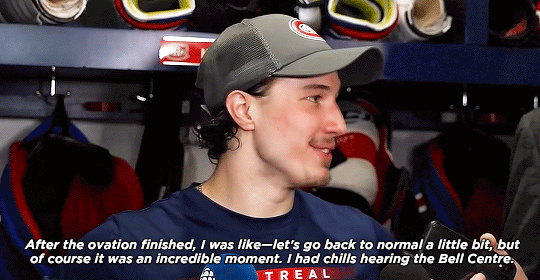
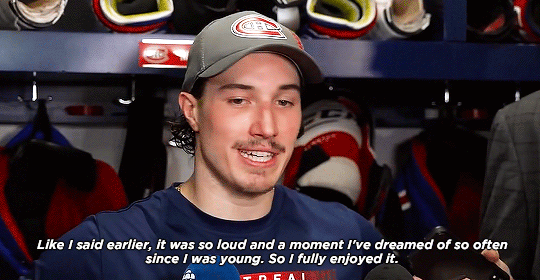
Après-match c. CBJ: Harvey-Pinard (03.25.23)
RHP: Honestly, I just wanted to keep playing. I wasn't really thinking about the hat trick. Of course you always want the hat trick, and you always want to score goals, but I wasn't thinking of anything more than that.
MSL: His details don't change. His read of the game doesn't change. He's capable of (breaking up offensive pressure) because he knows his job on the ice in the moment. Where the puck is going... There's a predictability to his game that helps his teammates both offensively and defensively.
BELZILE: [Would you say that his best quality as a player—as an individual—is having both feet really planted on the ground? That it doesn't feel like his head is getting inflated?] Yeah, that's his natural state. He's just such a good person, a nice guy. When you stay in it, and stay calm... I know that for him, it's just another day at the office. That’s kind of the mentality you need to have. Never too high, never too low. For a guy like him to get a hat trick, especially someone who deserves it this much, we couldn't be happier for him.
#rafaël harvey-pinard#montreal canadiens#how can we [doomerist verb] when we're so hardworking and earnest and sincere and#our hc prioritizes systemic integration via conversation rather than prescription and#he understands the fragmentation of character and development and effort and The Product and#what truly needs to be known and sought to become a better version of yourself and#our young core's threshold for cerebral self-evaluation parallels his compassion and capacity for critical dissection#etc.#gif
29 notes
·
View notes
Text
Teaching Nature to Break Man-made Chemical Bonds - Technology Org
New Post has been published on https://thedigitalinsider.com/teaching-nature-to-break-man-made-chemical-bonds-technology-org/
Teaching Nature to Break Man-made Chemical Bonds - Technology Org
For the first time, scientists have engineered an enzyme that can break stubborn man-made bonds between silicon and carbon that exist in widely used chemicals known as siloxanes or silicones. The discovery is a first step toward rendering the chemicals biodegradable, which can linger in the environment.
An artist’s depiction of an artificially evolved enzyme breaking a silicon-carbon bond. Image credit: Caltech/Dow
“Nature is an amazing chemist, and her repertoire now includes breaking bonds in siloxanes previously thought to evade attack by living organisms,” says Frances Arnold, the Linus Pauling Professor of Chemical Engineering, Bioengineering and Biochemistry at Caltech and winner of the 2018 Nobel Prize in Chemistry for her pioneering work in directed evolution, a method for engineering enzymes and other proteins using the principles of artificial selection.
Arnold and her colleagues, including Dimitris (Dimi) Katsoulis of Michigan-based Dow Inc. used directed evolution to create the new silicon–carbon bond-cleaving enzyme. The results are published in the issue of the journal Science.
The researchers say that while practical uses for their engineered enzyme could still be a decade away or more, its development opens the possibility that siloxanes could one day be degraded biologically. “For example, natural organisms could evolve in siloxane-rich environments to catalyze a similar reaction, or further improved versions of laboratory-evolved enzymes such as this one could possibly be used to treat siloxane contaminants in wastewater,” Arnold says.
Katsoulis explains that nature doesn’t use silicon–carbon bonds, “but we do and have been for about 80 years. The volatile nature of some of these compounds warrants health and environmental research to properly understand the degradation mechanisms of these materials in the environment.”
Siloxane chemicals can be found in countless products, including those used in household cleaning, personal care, and the automotive, construction, electronics, and aerospace industries. The compounds’ chemical backbone is made of silicon–oxygen bonds, while carbon-containing groups, often methyl, are attached to the silicon atoms. “The silicon–oxygen backbone gives the polymer an inorganic-like character while the silicon–methyl groups give the polymer organic-like characteristics. Thus, these polymers have unique material properties, such as high thermal and oxidative stability, low surface tension, and high backbone flexibility among others,” Katsoulis says.
Siloxanes are believed to persist in the environment for days to months, and, therefore, ongoing research aims to provide greater scientific understanding of the health and environmental safety of silicone materials. The chemicals naturally start to fragment into smaller pieces, especially in soil or aquatic environments, and those fragments become volatile or escape into the air, where they undergo degradation by reacting with free radicals in the atmosphere. Of all the bonds in siloxanes, the silicon–carbon bonds are the slowest to break down.
Katsoulis approached Arnold to collaborate on efforts to speed up siloxane degradation after he read about her lab’s work in coaxing nature to produce silicon–carbon bonds. In 2016, Arnold and her colleagues used directed evolution to engineer a bacterial protein called cytochrome c to form silicon–carbon bonds, a process that does not occur in nature. “We decided to get nature to do what only chemists could do—only better,” Arnold said in a Caltech news release. The research demonstrated that biology could make these bonds in ways that are more environmentally friendly than those traditionally used by chemists.
In the new study, the researchers wanted to find ways to break the bonds rather than create them. The scientists used directed evolution to evolve a bacterial enzyme called cytochrome P450. Directed evolution is similar to breeding dogs or horses in that the process is designed to bring out desired traits. The researchers first identified a variant of cytochrome P450 in their collection of enzymes that had a very weak ability to break silicon–carbon bonds in so-called linear and cyclic volatile methylsiloxanes, a common subgroup of the siloxane family.
They mutated the DNA of the cytochrome P450 and tested the new variant enzymes. The best performers were then mutated again, and the testing was repeated until the enzyme was active enough to enable the researchers to identify the products of the reaction and study the mechanism by which the enzyme works.
“Evolving enzymes to break these bonds in siloxanes presented unique hurdles. With directed evolution, we must evaluate hundreds of new enzymes in parallel to identify a few enzyme variants with improved activity,” says Tyler Fulton (PhD ’22), co-lead author of the study and a postdoctoral scholar at Caltech in Arnold’s lab. One challenge involved the siloxane molecules leaching plastic components from the 96-well plates used to screen the variants. To solve the problem, the team created new plates made from common lab supplies.
“Another challenge was finding the starting enzyme for the directed evolution process, one with even just a tiny amount of the desired activity,” Arnold says. “We found it in our unique collection of cytochrome P450s evolved in the laboratory for other types of new-to-nature silicon chemistry.”
The final improved enzyme does not directly cleave the silicon–carbon bond but rather oxidizes a methyl group in the siloxanes in two sequential steps. Basically, this means that two carbon–hydrogen bonds are replaced with carbon–oxygen bonds, and this change allows the silicon–carbon bond to break more readily.
The research draws parallels to studies involving a plastic-eating enzyme, explains Fulton, referring to a polyethylene terephthalate (PET)-degrading enzyme discovered in the bacteria Ideonella sakaiensis in 2016 by a different group of researchers. “While the PET-degrading enzyme was discovered by nature rather than by engineers, that enzyme inspired other innovations that are finally coming to fruition for plastic degradation. We hope this demonstration will similarly inspire further work to help break down siloxane compounds,” he says.
Written by Whitney Clavin
Source: Caltech
You can offer your link to a page which is relevant to the topic of this post.
#aerospace#air#amazing#artificial#atmosphere#atoms#automotive#Bacteria#biochemistry#biodegradable#biodegradable materials#bioengineering#Biology#caltech#carbon#challenge#change#chemical#chemical bonds#Chemical engineering#chemicals#chemistry#Chemistry & materials science news#collaborate#construction#development#DNA#dogs#Electronics#Engineer
0 notes
Text
Secret Royal Inspector & Joy (South Korea, 2021) – A Dramavixen Review

Beware of spoilers!
Imagine that you are a parent. If you are a parent, even better. Now imagine that all the dramas you have watched are your beloved children. You have the intelligent one who’s diligent and at the top of their class, the one who’s lacking in the smarts department but has a heart of gold. And then. You have that one kid who—if they just put in the effort—could excel in whatever they want to do; but they decide that cooping themselves up in your basement and leeching off your faith in them will suffice.
Please greet Secret Royal Inspector & Joy – the disappointment of the drama family.
Fragmented Scoring:
It’s Story Time (plot; weight of 40%) = 6.5/9
Who Even Are You? (characters; weight of 40%) = 6.5/9
Technically Speaking (production; weight of 20%) = 7/9
Extra; Read All About It (extraneous; extra-credit weight of 10% when applicable) = 0/9
Nine-Tailed Total: 6.5(.4)+6.5(.4)+7(.2)+0(.1) = 6.6/9 (73%)
It’s Story Time (6.5/9)
To be accurate, I’m not sure that it’s entirely fair to call this drama a “disappointment” considering how I didn’t have many expectations in the first place. No part of this show’s marketing depicted it as anything that one should be taking seriously. That was also the reason why I decided to watch it: due to my parents’ hankering for a drama that both doesn’t require much brainpower but also isn’t insulting to whatever brainpower you exert in watching it, I opted for this one.
In spite of my small (read: big) disagreements with this show, I still think that I made the right decision. We had a great time sinking into Secret Inspector’s satirical and fusion elements. At no point did it ever try too hard to be deep or smart. It was what it claimed to be, and was satisfied with that.
But I, the overly demanding parent, am not satisfied.
The reason this drama ultimately grew into its role as a “disappointment” is because it started giving me hope. At first, I just found it hysterical; but then I found myself growing intrigued. I adored the idea of an indolent king whose ultimate goal is to laze around and do anything but his all-important duties. The male lead’s desire to sell dumplings and not go to work at his office job is equally relatable. When it was revealed that the king was actually behind the death of his son, I was floored because this meant that somehow, the writer had to hold him responsible for it. A historical drama? Holding the big boss responsible? Well, color me interested.
And...it was a letdown. Every time I got my hopes up, something would happen that wrestled me back to the floor. Developments come off as terribly lukewarm and convenient, depending on where the plot direction “needs” to go. Plot holes dig themselves all over the place. Characters are rotated in and out in a haphazard manner and then dismissed and/or killed off as necessary. The political conspiracy is watered down a lot, I’m assuming in order to accommodate the lighthearted comedy genre; a sad fact, considering that the conspiracy is actually pretty interesting. Look at this dysfunctional Park family, with a father using his sons as pawns to climb the ladder. Look at these ladies, trading overseas and shooting shotguns and putting disobedient men to sleep with the fishies. How does a story with these elements turn out as draggy and tame as it did?
Major issues come in around the ending: did I understand that Tae Seo was most likely going to die? Yes. Did I expect that he would meet his end so pointlessly? Hell no. Why would a law enforcement officer like Yi Eon permit a major witness (not to mention three major witnesses, heavens almighty) to go by himself to turn himself in? With zero guards or precautions or anything? When everyone involved in this case is getting murdered left and right? Hello? Brain cells?

No one even buried him or the other two sacrifices. Just adding insult to injury, I guess.
And I guess I shouldn’t have been surprised that our lowly protagonists can’t touch the king with their peasant hands, but is it really my fault for expecting something when the entire drama is centered around being forward-thinking? The confrontation between Yi Eon and the king is very, very lame. It doesn’t feel anything like an encounter between a man and his nemesis at all. It is, however, oddly reminiscent of how I speak to my mom when she tells me to do something and I dare to rebuke her. So if that’s what they were going for...success?
Also, this is a nitpicky detail, but I really despise when shows about criminal justice turn the tables and abuse the suspects/perpetrators. In terms of time and setting, cruelty in the context of interrogations fits, so that’s not what I’m complaining about. But that short scene at the end when Park Do Soo is being taken away and the guards decide to shove him down and kick him? Why is it portrayed as if that treatment is what he deserves, as if we in the audience should feel satisfied seeing that? Is it really okay for those in power to abuse criminals, especially when they’re already going to serve out their sentence? Sorry, I don’t see how that’s anything but a different form of tyranny and injustice.
I do think it’s unwise of me to have so many expectations of a show that’s meant to be fun. And while I found a lot of it entertaining, it certainly lacks the depth needed to be memorable.
Who Even Are You? (6.5/9)
Aside from Tae Seo, I wasn’t in love with any of the other characters. The only thing sustaining the dead weight of these poor characterizations was everyone’s acting, and even then...there’s only so much an actor can do.
I’m going to first rip off the Band-Aid that is Park Tae Seo, who is by far the most compelling character, yet ends up being slaughtered by the writers like an ox that’s grown too old to pull carts anymore. The moment that it was revealed that he backed out of murdering the Crown Prince after bearing witness to this royal family member’s kindness...ah, I was filled with dissatisfaction. That gave him too much promise far too late.

Oh, the places we could have gone with him. We literally could have had it all. Then he just got stabbed on the beach, twice. Okay.
Imagine an alternate universe where Tae Seo is the main character. There is no world where that wouldn’t have been a far more interesting drama to execute. Anti-heroes are appealing precisely because they don’t subscribe to traditional goody-two-shoes moral values. They feel human. In comparison to the protagonists of this show, Tae Seo is the one who truly struggles internally. His horrific actions weighed in counter to his desire for equality and acceptance could have been such an amazing focal point of this show, but noooo. Apparently, villains aren’t allowed to fully redeem themselves. Because reasons.
While we’re on the topic of Tae Seo, his “mother”—who turns out to be his kidnapper, in essence—really gets off so easy in this show that it offends me. I feel like everyone in the show tries really hard to excuse the fact that her initial swapping of the Park babies directly caused the suffering of both children. Tae Seo’s struggles becoming ones of laughable irony; that delivers a powerful message, yes. But are they going to pretend that her biological son, growing up under supposed “nobility,” is literally the most mentally unhealthy person in the entire cast? She had a hand in that. The moms in this show are really such a mess, but under the guise of dispelling inequality, they get a free pass.
Ugh. Anyways.
Protagonists exist, right?
I think Taecyeon did a fine job portraying Ra Yi Eon. That said, this character is fantastically boring. See, when the summary of the show classifies him as a guy whose “dream is to buy a small dumpling restaurant and run the business. He wants an easy going life, but he is smart enough to pass the state examination that he has just taken;” I thought that meant we were going to see his growth from an obsessive foodie into an obsessive foodie who learns the value of justice, truth, and wielding his power and abilities to keep those ideals alive. (synopsis credit: Asianwiki)
And what did I get? Some dude who happens to cook pretty well and starts off in the first episode with an unstoppable desire to solve murders. In that moment, I saw my dreams of character development evaporate into nothingness. Oh, the pain is still fresh.

Does it need to be said that Taecyeon’s face brings this role a lot of value? Wait...get yourself together! Looks aren’t everything!
The death of the Crown Prince is a rather incendiary catalyst for personality change, and it could have gone one of two ways. One: Yi Eon is severely disillusioned by the nation’s lack of ability to protect those who strive to truly better it, and hence absorbs himself in cooking to avoid all political involvement. Or two: Yi Eon, knowing how much the Crown Prince wanted to improve the conditions within the country, takes it upon himself to use his own intelligence and capabilities to rise in the ranks and change the system from the inside. The first option, as I mentioned, is a path to greater character development. The second is more traditional, but is a stable way to portray a revenge story.
What did Secret Inspector do, instead? He’s a “secret” inspector, yet he announces his identity within, what, the first two episodes to catch a small fry criminal? That’s what I’d call “unprofessional.” He loves food, but he visits a whopping grand total of zero (apologies for my poor memory, but I think this is an accurate count) nice restaurants to eat, and all the scenes in which he cooks...well, the food doesn’t look all that amazing, either. That’s what I’d call a “letdown.” And in the end, after shutting down the people behind the string of murders and the death of his friend, he still decides to quit and live happily ever after, supposedly. Even while corruption is still running rampant up in the palace. That’s what I’d call “unfulfilling.”
I understand that the central focus of this show is on the individual: Yi Eon shouldn’t have to justify his personal dreams, nor sacrifice his life to serve his country if he doesn’t want to. Admittedly, I don’t buy into that philosophy too much. While I think it’s important to preserve self-identity, I also think that if your nation is rotting from the inside and you have the ability to mitigate that problem...you kind of have an ethical responsibility to do so. But what do I know. I’m just a salty audience member.
Onto the female lead. Kim Jo Yi’s entire character revolves around the importance of finding your happiness, and in the way that you define it. Her married life is not torturous, but it doesn’t have to be for her to request a divorce. Agreed. But I really don’t find her character all that interesting, either.
Jo Yi, in the beginning, is charismatic because she knows what she wants, and she’ll do it alone if she has to. She blackmails a government official into fulfilling her request for a divorce, even while scared to death. Then, in the latter half of the show, her presence wanes to the point that you’re not really sure what she represents. For one thing, she gets a house for cheap because she has a capable friend who (lo and behold) is romantically interested in her. Granted, he doesn’t use his feelings against her, but his existence is still awfully convenient, isn’t it? Meanwhile, she’s very good with textiles and clothes, and those talents are displayed...like, one time. I really don’t think that this character was written well enough, especially if she’s supposed to represent the female population that desires independence.
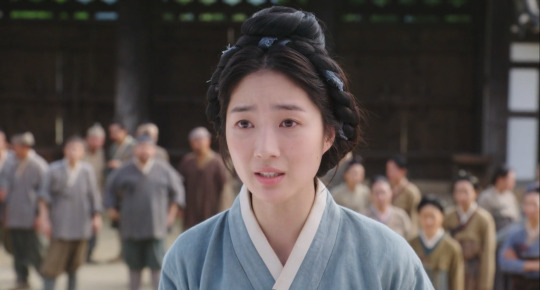
She peaked at her divorce trial. That was in the first two episodes.
And I don’t want to come off as a Debbie Downer, but I don’t think that Kim Hye Yoon’s acting skills were capitalized on in this drama. Jo Yi is extremely similar to Hye Yoon’s role as Dan Oh in Extraordinary You, but that bubbly, happy-go-lucky character doesn’t work in this one. It’s fun, but it eventually becomes dry when she doesn’t seem to grow beyond that – especially in a historical setting.
In theory, this idea of a woman attempting to get a divorce in a misogynistic era should create a lot of tension. Even if we’re talking comedy like Secret Inspector, the writers have to give us something to look forward to. But...where is it?
Let’s be honest here, this show does a very halfhearted job of getting you on-board with the characters’ dreams. This applies to Jo Yi, but also to Yi Eon. Gosh, this couple is just...really meant for each other, huh?
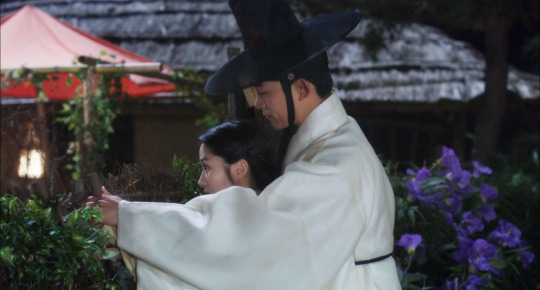
Admittedly, I do enjoy height differences. Is that enough to trick me into seeing chemistry? Ehhhhhh no. Maybe I’m just a jaded single woman.
I never feel either character’s intense need to chase after what they want in a world that is supposedly setting them back. It always just feels like they’re prancing along in their life, and expecting life to go along with their desires. If life were that simple, would I be the way that I am? No; the answer is no.
I imagine that most people can speak to how suffocating it feels to be forced to do something you don’t want to do, especially when you’re young and have that fight in you. I didn’t get any sense of that inner turmoil; and yes, I understand that this drama is a comedy. But comedies shouldn’t be shallow in order to be funny.
Technically Speaking (7/9)
Standard scoring here; nothing to brag about or rag on. I did rather enjoy the Wild West-esque music though. That was quite a nice touch. Would I have been more entertained if they’d attached spurs to their cloth shoes and whipped out those giant guns that Jo Yi’s mother possessed at high noon? Maybe. Would’ve been an entirely different show, though.
Extra; Read All About It (0/9)
Y’all really thought I’d be dishing out extra credit points just because 2PM had a big role in my teenage days? Hah!
Close call, actually. Almost got me.
-----
Altogether, Secret Inspector is a fun casual watch. Unfortunately, I take things very seriously.
This is one of those shows that’s not horrible, but not one I’d recommend to others. The Asian drama is rapidly expanding, and there are just so many dramas out there that are better worth our time.
#secret royal inspector and joy#어사와 조이#scribbles*#*#my resolution is to not watch as many dramas this year#so that ironically means i might write more reviews which i'm up for#this is in honor of the anon who reminded me that i haven't written a full-length review in over 2 years#thank you
8 notes
·
View notes
Text
Meet my Guardians :) [part 1?]
I have been playing Eldarya ever since I was 14. For the past few years, I had been reading the story religiously, mixing in headcanons to fill plot-holes, and fleshing out Erika until she became something entirely different.
Her character soon split into my three mains, all of whom I will introduce to you all in this post! In my Eldarya AU, they all exist in the same universe, and the three of them play crucial roles in the Oracle’s prophecy. I will develop them more as time goes by hmhm
1-Monnika


Name: Monnika Defreine (she/her)
Birth date: 14th November [ ♏︎ ]
Age: 22
Species: Faelienne (Aengel+Human)
MBTI: INFP
Guard: Absynthe Guard
Familiar: Lillith (Bâkhrâhell)
LI: Leiftan (both in TO and in ANE)
Occupation in the Guard of Eel: She has taken on the role of a teacher for many children inside the H.Q’s walls. She specializes in lyrical poetry and composition. Whenever she is free from her teaching job, she adventures out into the forest to collect ingredients for ointments and potion spells.
Sub-occupation: Trained alchemist, Oracle visualizer. Monnika has frequent premonitory dreams and visions featuring the Oracle, but she cannot understand them nor speak in their tongue. Her visual communication with the Oracle is important regardless, and she’s the most attached to it.
Weapon of choice: Sword
Pros: Forgiving, educated, compassionate, patient, reliable.
Cons: A push-over, easily biased, indecisive, self-victimizing, very edgy.
Monnika follows the more “canon Erika” path. She is the only one of the main three to have come from Earth through the portal we see at the beginning of the game. She is also the only one to retain an element of Aengel blood, albeit stronger than Erika’s. The option was ruled out for canon Erika, but Monnika is indeed adopted and a faelienne. She’s aware of her adoption but does not know anything else about her background, nor has she cared to know.
In her childhood, she was often reported to affect nearby light and energy sources. Her parents believed her to simply be sensitive to electromagnetic fields. This explanation is usually given to spiritual mediums: The energy they accumulate is said to be what causes paranormal phenomena around them.
Once she crossed the portal into Eldarya, she began regulating her Maana, and her powers started manifesting more. The eventual blood transfusion and ‘soul-tethering’ with Leiftan jumpstarted a physical transformation, leaving her stuck out of her human disguise. Now, do not let her edgy appearance fool you: she is an Aengel.
Monnika's form is inspired by traditional Seraphims— that is, ominous balls of eyes and feathers. Her blood is ancient, and her outside reflects it: Upon transforming, all of her grows in size monstrously. She prostrates, back heavy with wings, as blazing white light fills her sockets. Her spindly fingers dig into the soil, like the feeble limbs of a black widow spider. She is one with the earth her mother bore her from; in her presence, one feels as though judgment is neigh.
There are no reasons to fear her, though, for she is kind and reserved. Monnika finds joy in tranquility and avoids company most of the time. After her initial transformation, she grew more distant, ashamed of her new condition. Her human blood keeps her from smoothly regulating her powers, so she is stuck in her angel form from the first time it occurs to the end of the War for Eldarya, before the 7-year coma. With training, she is finally able to change back to a more human disguise.
Leiftan and Monnika are, indeed, soulmates. She always felt herself gravitate towards him and followed this attraction without remorse. Her alliance stands with Leiftan and with Leiftan only, which made her position in TO quite complicated. Her lover's crimes were heinous, but her eagerness to build bridges between them again kept her from understanding the seriousness of it all. After their coma, her spirit and trust are broken by Leiftan's distance. She's then left to pine from afar, desperately trying to comprehend how she's supposed to live with half a heart.
2-Astraea


Name: Astraea Varma (she/her)
Birth date: 5th March [ ♓︎ ]
Age: 24
Species: Euryhalin nomadic mermaid
MBTI: ISFJ
Guard: Obsidian Guard
Familiar: Thetis (Blobbiathan)
LI: Valkyon (TO) & Mathieu (ANE)
Occupation in the Guard of Eel: Unwilling to find herself (or her peers) wounded and helpless in the midst of battle, she started working as a nurse under the protection of Ewelein. Her eagerness to learn and help others soon turned her into a sponge for medical knowledge.
Sub-occupation: Obsidian infantry soldier, Crystal fragment detector. Astraea can easily sense the presence of crystal fragments, corrupted or not. She can easily follow them to where they are, as if they left a visible trail.
Weapon of choice: Hammer or enchanted fists.
Pros: law-abiding, empathetic, just, optimistic, fun to be around.
Cons: Inflexible, holds grudges, bad loser, stubborn, quick to judge.
Astraea washed up on a small stream that crosses the forest of Eel. She was found by Ykhar and Alajéa on the noon of the same day that Monnika appeared in the Crystal Room. Astraea had no recollection of her journey upon waking up beside the fact that she was looking for something significant. She made allusions to it being noted down in her journals, all of which she lost in the last half of her trip.
She comes from a clan of Euryhalin nomadic mermaids, aquatic creatures who can travel both through rivers and oceans according to migratory seasons. These migration patterns are marked by the moon and the stars, so these mermaids are essentially nocturnal. This is similar (if not the same, even) to the structure and tradition of Alajéa and her sister Colaïa’s clan. The likeness between Alajéa and Astraea’s experiences will eventually strengthen the bond between them, and make them grow closer than ever— despite the initial moments of sourness. The only thing that could throw a spanner in the works is Astraea's distaste for Karenn, Alajéa's best friend. The breach between them is no different in ANE, as Karenn's overall demeanor is quick to make Astraea's blood boil.
Despite being an Obsidian, Astraea fears conflict and very much dislikes harming others. She is not one to await battle with a smile, nor is she an outstanding warrior by herself. Nevertheless, it is her wit, perseverance, and fairness that landed her on that guard. Moments of doubt, like passing mists, may have clouded her self-perception; She may have broken down many times but always stood up again to dedicate more effort to her cause. She fights when necessary, using her knowledge in enchantments to gather up fists of rocks as her weapons.
Incredibly passionate about justice and discipline, Astraea held the Obsidian chief Valkyon in high regard. He became one of her confidants in the tortuous search for her memories; then, a partner to stand by as the world caved in. After the War and the 7-year coma, Astraea withdrew into isolation, grieving over the loss of her lover and mentor. The cherry tree that once was Valkyon’s shelter is now Astraea’s place of reflection— a deep, melancholic pondering only Mathieu, a new friend, and Sonzaishinai, an old friend, can get her out of.
3)Sonzaishinai

Name: Hélène “Sonzaishinai” Müller(she/her)
Birth date: 20th May [ ♊︎ ]
Age: 25
Species: Nocturnal fae (moth variant)
MBTI: ENTP
Guard: Shadow Guard
Familiar: Skade (Owlett)
LI: Nevra (TO) & Lance (ANE)
Occupation in the Guard of Eel: Hélène had always shown a questionable interest in the archives of the H.Q. When Ykhar offered her to work as an adjoined archive librarian, she could not pass it up. She knows the catalogue by heart and has gathered a bunch of...information that may be of use to her.
Sub-occupation: Master archer, Oracle interpreter. Sonzaishinai has auditory hallucinations featuring the Oracle. She is able to understand her tongue and speak in the Ancient tongue of Eel, thus being able to interpret many crucial pieces of information.
Weapon of choice: Bow and arrow.
Pros: Diplomatic, humorous, witty, loyal, affectionate.
Cons: Hides information, violent under stress, impulsive, patronizing.
Sonzaishinai was brought to the H.Q disheveled and delirious by a group of local Purreko merchants. They had accused her of theft (bread? a dragon tear? so they said), and she was thrown into a cell pre-emptively. Nevertheless, her worn-down state and the lack of evidence ended the trial period rather quickly. For lack of planning and information about her, she was kept in jail for an extra day. Sonzaishinai was in prison at the same time as Monnika. The 'masked man' freed both, and the girls parted ways at the Hall of Doors.
As a disoriented newcomer, Sonzaishinai was granted shelter. She was allowed three days to recover and decide on her fate. She would either hit the road and return to her homeland or commit to becoming a productive citizen of Eel— by settling and supporting local markets, or joining the staff. Her affairs were thoroughly searched, and nothing was found but a couple notebooks filled with inscriptions in an alphabet unknown. Under questioning, Sonzaishinai soon proved to be, somehow, proficient in languages galore, many of them forgotten and unused.
She soon joined the same recruit program as Monnika and Astraea...not without the Guard's persuasion, of course. There, Sonzaishinai and Astraea grew close beyond belief. They learned to lean on each other, bound by laughter and blind trust. Sonzaishinai considers Astraea a sister and does not hesitate to call her so— while Astraea always goes to Sonzaishinai for guidance. In ANE's weapon giving ceremony, Hélène chooses to call her new bow (it is Monnika who gets the sword) "Astraea", for she believes the younger mermaid to be her protection and good luck charm.
The nickname "Sonzai Shinai" was given to her by a guard colleague from the Jade Coast. It is a verbal expression of Japanese origin, meaning "there is not", "it does not exist". The culprit behind Hélène's telling nickname is no other than her silence: One can barely hear her arrive, and she always seems to appear as suddenly as she fades away. With time, she fully adopted the nickname, and nobody really calls her Hélène anymore—with rare exceptions.
Nocturnal faes are beings as mysterious and charming as they are dangerous. Most of them present themselves as delicate young women, who seem far too attractive or even stuck in time, never aging. Behind their lips, however, hide sharp teeth. They are carnivorous and oftentimes conniving, some even venomous, just like the habitats or plants they frequent. It depends on the individual, of course, but they do not have the best reputation around. Whatever they really are, it is not advisable to seal deals with them. They always have a trick up their sleeve.
Although Hélène can be 100% trusted if you are her ally, she does tend to keep many things a secret. It was her that contacted Lance in TO, never telling Miiko and even asking him to take her along. She built a sense of trust between them that allowed Lance to feel comfortable enough to kidnap her in particular, hoping she'd be the one to understand his goals the most. He'd never thought that she'd know as much as him and that she'd been using him to get new leads the entire time. Despite it all, they were always capable of dialogue, which threatens to come back in an incredibly mentally stimulating way upon their new meeting.
Regarding Nevra, Sonzaishinai had always felt a strong, nurturing love towards him. He'd proven to be an ambitious brat with too big of an ego one too many times, but his light-heartedness and genuine attachment got to her rather quickly. Upon waking up after the 7-year coma, she did not recognize the moody and regretful man before her. He'd promised to love her forever, but now she stood alone spiteful, facing empty words. Despite their falling out, she will always have a soft spot for him and won't doubt to put herself in harm's way for him.
#eldarya#eldarya a new era#gardienne#erika#beemov#eldarya oc#oc#eldarya guardian#original character#eldarya ane#eldarya to#eldarya spoilers#eldarya karenn#eldarya alajea#eldarya leiftan#eldarya nevra#eldarya valkyon#eldarya lance
29 notes
·
View notes
Text
Episode 34 arrives and it’s a MUCH NEEDED breath of first air. I mean, this episode could have actually BEEN a 99 Adventure episode. I guess at least one person on the production team has actually seen the old show at least once!
In my opinion, it doesn’t quite equal the cuteness, silliness, and personality of similar 99 episodes, but it comes very close, and it’s certainly the best we’ve had in a long long while.
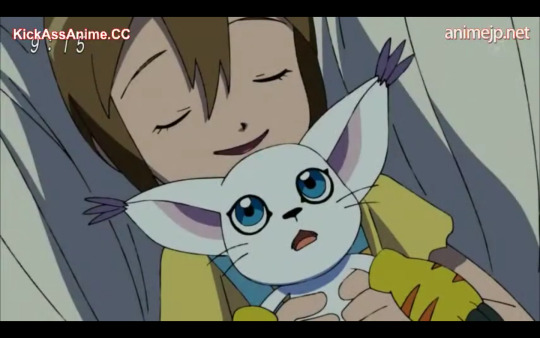
And it’s all because of these two.
More below!
The episode bizarrely begins with Tailmon barking to communicate with Komondomon. Which raises the question, if no one could talk with Komondomon before because he can only bark, how were they communicating? Did Lopmon just tell Komondomon everything he needed to know and tell the kids “just follow his lead” or something??
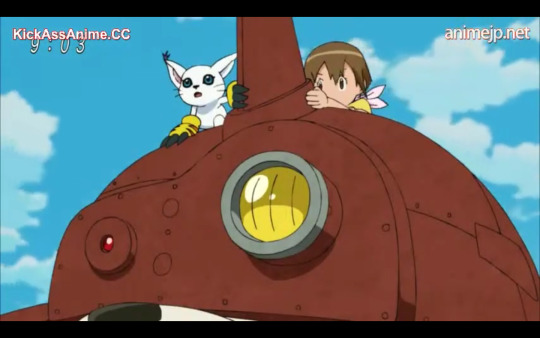
Also Tailmon’s opening line being her barking is pretty surreal. And yet, fitting for a cat Digimon who is a dog at Child level.
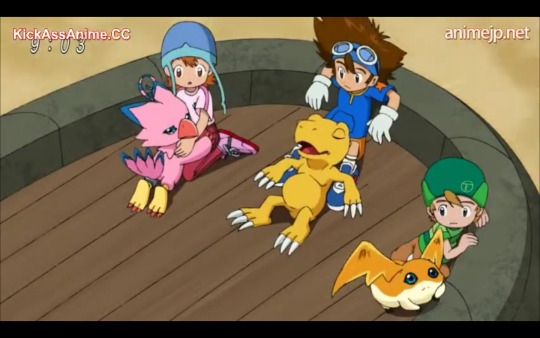
The kids are shown taking a break - the first sign that this episode is gonna be A Bit Different.
Taichi: Something feels weird. Why aren’t we fighting?
Sora: Taichi, don’t you think you should rest once in a while?
Taichi: I mean, I do, I just got the impression the rest of the world didn’t agree...
Sora: By the way, why do we like this world that constantly tries to kill us and never gives us any pleasant memories so much? Why don’t we just take our partners to the human world and leave this place to its fate?
Taichi: How else am I gonna get an outlet for my pent up aggression and adrenaline junkie issues?
Sora: That’s your backstory?
Taichi: I’m a complicated man.

Komondomon then randomly jumps... into the sea. “Oh no, they’ll drown!” No, they won’t, because Komondomon has the ability to build a dome over his back trapping oxygen inside. Submarimon I get, but Komondomon?

As they dive, Tailmon explains what we learned last week about Millenniumon trying to resurrect himself with a new body. Apparently a very large fragment of him is located undersea in a place called Farga (transliteration TBA). She thinks resentfully about how she was almost absorbed into Millenniumon’s most recent resurrection effort.
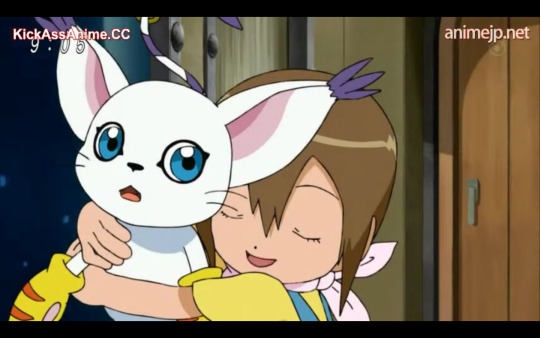
Hikari tackles her with a comforting hug, which Tailmon seems a bit discomfited by. But does not object.

Tailmon considers defeating Millenniumon for good to be her personal mission as a Holy Digimon. Patamon sees her determination and does his best to put on his game face too. It’s like being glared at by a sock puppet.

Tailmon: I can’t allow Hikari to be put in danger. It’s my job as the Holy Digimon -

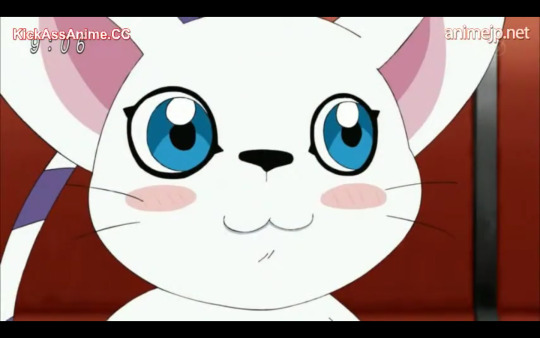
Tailmon: - gosh darnit and she’s just so cute too!

They wind up getting hit by a rip current or something?? and thrown into another weird submarine sort of thing. They discourteously break a hole in it and wind up inside a self-sustaining underwater kingdom, apparently, which instantly goes on Red Alert as Manbomon come to attack them.
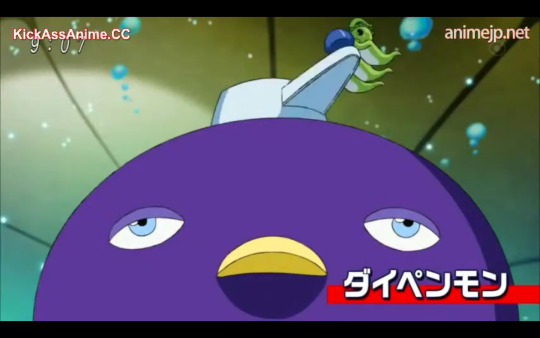
This is Daipenmon, or Big Penguin Monster. I love him. He is glorious. Gaze upon his expression of perpetually stoned haze.
Daipenmon: You try steering this thing every day in and out nonstop without turning to hard drugs.
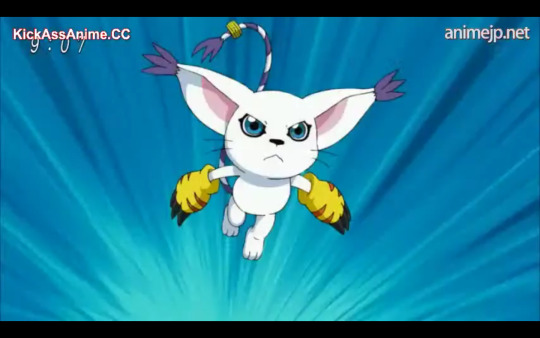
She attac!
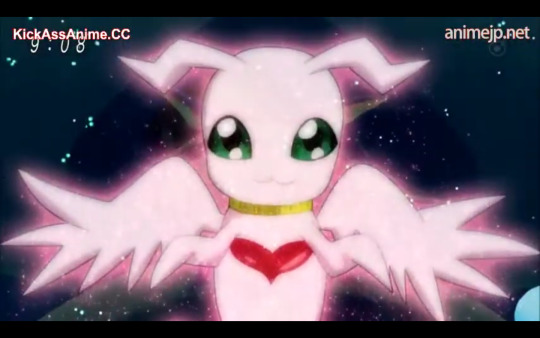
While fighting, some Mantaraymon break in through the hole they made and the Manbomon go to drive them off as apparently they are not welcome. Then MarineAngemon appears in all her creepy glory and they sort everything out.
MarineAngemon: Oh, Tailmon, I see you’re a Holy Digimon! I can tell by your Holy Ring. I have one too.
Takeru: Patamon, why don’t you have a Holy Ring?
Patamon: .... -.-’

Look! See! So cute! They are floating on bubbles! All the kids get their own and each has an individual design that shows their personality. Here Tailmon tries desperately to keep Hikari from falling off. I missed this kind of thing! Flashbacks to Monzaemon’s Toytown...
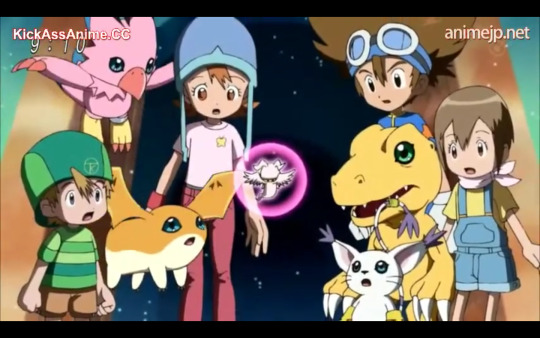
Turns out MarineAngemon is extremely small and the scene before was all “don’t pay attention to that man behind the curtain” type scare tactics. Not very effective since no matter how big MarineAngemon gets, she’s still extremely adorable. She invites them to stay the night. I really expected it to be a trap, but it wasn’t.

OH MY GOD IS THAT FOOD ARE THEY EATING ACTUAL FOOD OMG OMG
quick someone alert the producers! Someone’s having FUN with this show! I was starting to think that was illegal or something!
It’s not AS fun as when they went to Devimon’s illusory castle in 99 Adventure and stuffed their faces after starving and living on potentially poisonous eggs for a week... but I’ll take it.
Meanwhile an undersea band plays music and Taichi ACTS LIKE THE FIFTH GRADE CHILD THAT HE IS. For about 0.5 seconds but HEY he did something child-like! holy cheez wiz batman!
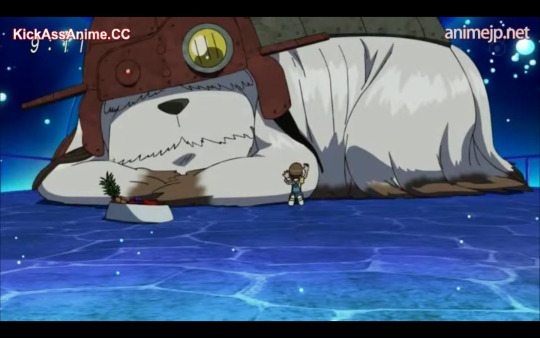
Hikari is mysteriously absent so Tailmon goes to find her. Turns out she’s asked MarineAngemon to heal Komondomon who is tired and wounded from their journey. Tailmon’s like, “Aw, what a nice person she is.” I’m all for exceptionally kind-hearted Hikari, but taking care of Komondomon should have been priority 1 for EVERYONE. At least Sora should have thought of it. I can see Taichi being too forward-focused, and Takeru a dumb eight year old, but Sora would definitely have thought about Komondomon.
Clearly the show wanted to establish how nice Hikari is, but I hate when shows inadvertently make all the other characters look like asses just to trump up the current star...
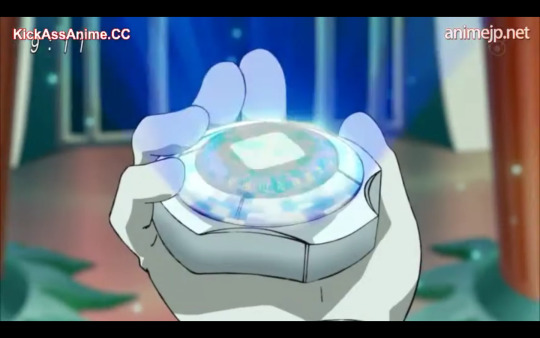
Taichi’s digivice glows and...
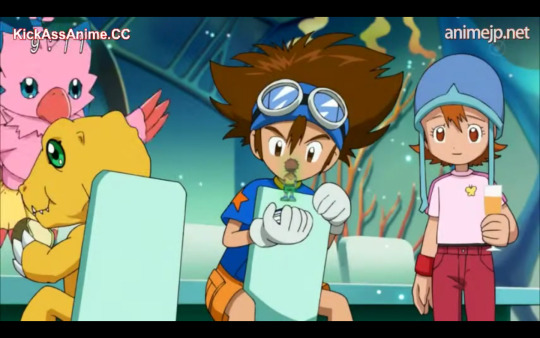
... MINI KOUSHIROU RETURNS!!! Hurray!
Um, what’s that Sora’s drinking? A mimosa? o.O
Well anyway, Koushirou just shows up to remind everyone of the situation with the satellites and that things are getting worse.
Taichi: Do you have any idea what we can do about it?
Koushirou: No, but I’ll keep you posted.
Taichi: Thanks for nothing braindead
Koushirou: That’s it! You’re not the man I knew in episode 3 anymore! I want a divorce!
Taichi: Fine with me it’s not like you’re ever home anyway!
Koushirou: Well at least I’m not cheating with YAMATO!
Taichi: I HAVE NEEDS!
*cough*

Uh, I know Taichi is shorter than Sora, but he looks... pretty tiny here... lol. Or maybe Sora’s just had a growth spurt again.
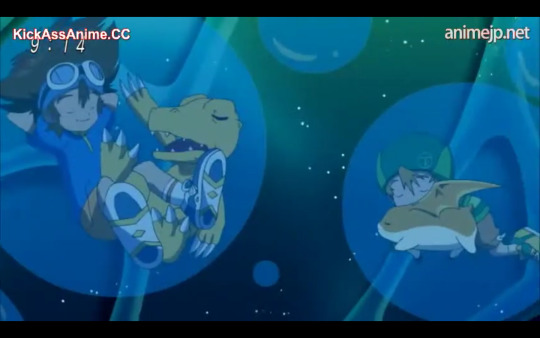
They spend the night sleeping in bubbles. Aw.
By the way, question: the kids seem able to walk and breath normally in MarineAngemon’s kingdom... but the fish-type Digimon can also swim around normally. And it seems the kids wouldn’t be able to survive in the ocean itself, but they and the fish can both survive here? And yet bubbles? What... what kind of scientific anomaly is this place??
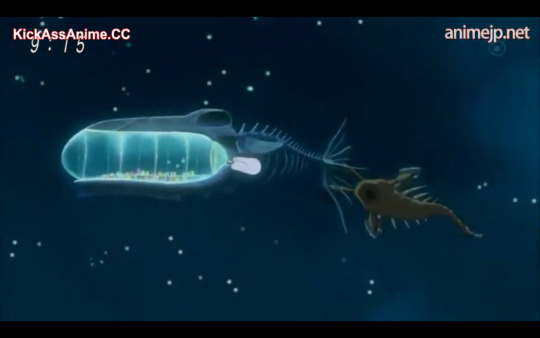
So... MarineAngemon’s kingdom appears to be a Whamon’s corpse! X’D Wow that’s dark.
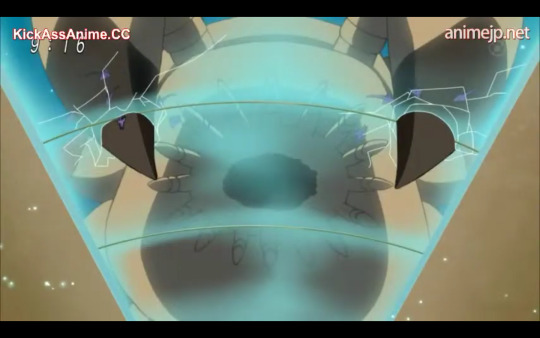
They are attacked by Anomalocarimon! For reasons. Actually, they did explain earlier that the ocean Digimon have been more aggressive lately and it seems to be the influence of Millenniumon’s stone in Farga or whatever.
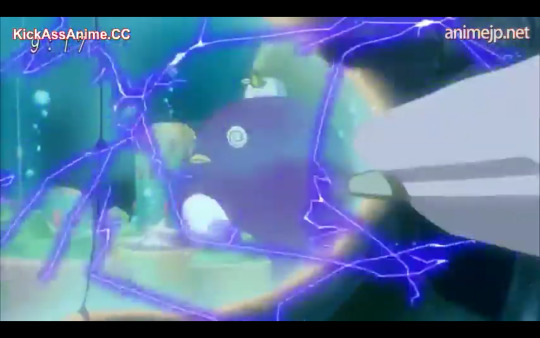
Daipenmon: This sucks I don’t have health insurance

Tailmon frantically tries to fight off the intruders while also keeping Hikari out of danger. This entire episode is about Tailmon wanting to protect Hikari and keep her at arm’s length so she doesn’t end up in danger, while Hikari just keeps trying to stay close to Tailmon and support her.
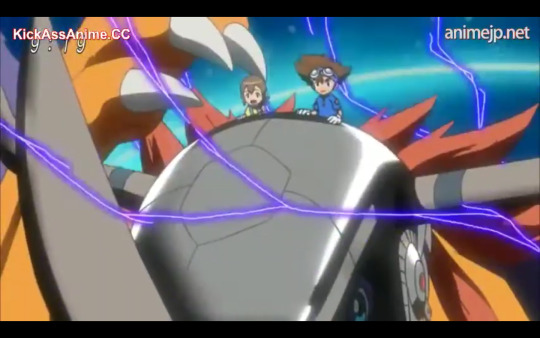
Tailmon: I can’t take you with me, Hikari. It’s too dangerous.
Hikari: Fine. Big brother, will you bring me into the heat of the action with you?
Taichi: Sure thing.
Tailmon: ...

In his defense, Taichi does seem a bit freaked when Hikari TAKES A FLYING LEAP off MetalGreymon toward Tailmon.
(no I really love that Taichi immediately understands why Hikari wants to fight and takes her right to her partner without even a token “nuu but you’re still a baby.” I mean, if Yamato’s cool with Takeru being in danger all the time, Taichi shouldn’t be much worried about it...
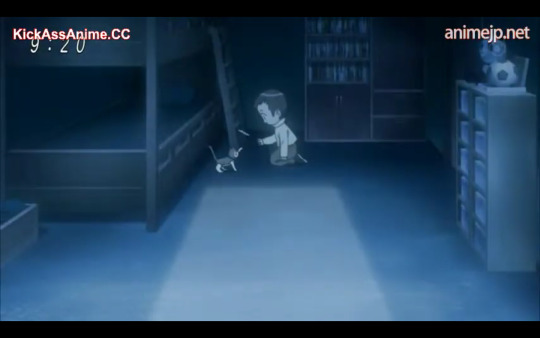
Hikari has a flashback! Turns out she’s heard Tailmon calling for her since she as a little kid!
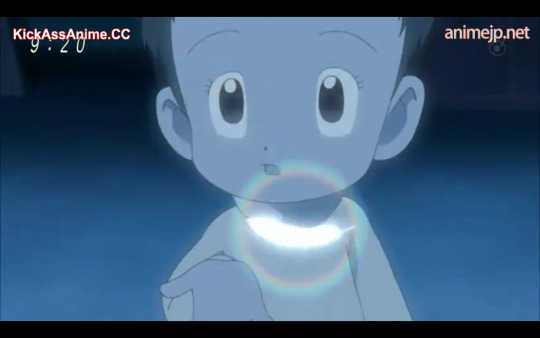
She caught one of Angewomon’s feathers back then too.
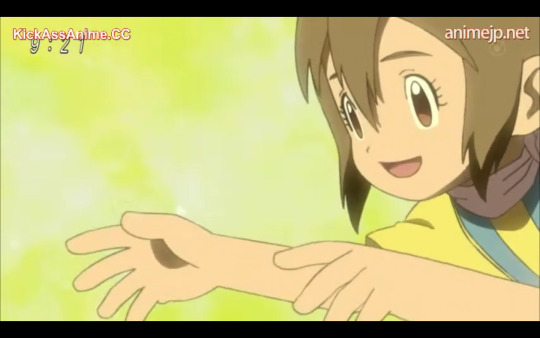
Hikari promises Tailmon that she’ll be by her side. Awww.

Hands again.
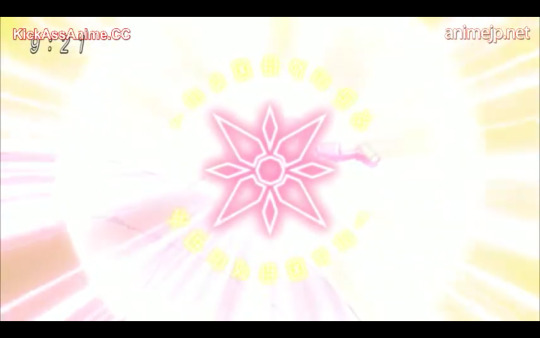
Crest of Light! I kind of expect that we’ll find out about the Crests and what they mean really fast at the end of the season... although I’m still kind of hoping Mimi is mining Crest crystals atm.

Hikari is able to magically produce a Digivice... I’d completely forgot she didn’t have one till now.
Here I expected Tailmon would evolve, but instead, the power of Light appears to give everyone a power boost like it’s done in the past. They all glow with their Crest colors, kids and partners alike (except for some reason Tailmon glows yellow???) and launch a joint attack on Anomalocarimon and defeat him. Yay.
Then they say goodbye to MarineAngemon and go on their way, I guess to Farga.
So... yeah! it was a nice episode. It had a theme. There was fighting, but it didn’t overwhelm everything else. There was character development. I really can’t complain about it. And it was SHOCKING that Taichi had so few lines (compared to what’s become the norm - a GOOD shock but still I was like “omg what’s going on!!”)
I am just confused because why is this sort of episode happening when we haven’t seen it in ages? What happened in that interim between when they all met up after the first team split up and just now that prevented the show writers from having fun with the show and just writing nonstop fighting all the time? I’m so confused. It makes no sense. Still suspecting that they couldn’t get anyone to come in and voice characters for long enough so they just focused on Sanpei Yuuko/Taichi, but without the others they couldn’t figure out how to push the show forward and make it fun too... Idk. It’s so weird. But oh well. We got a good episode, and maybe it’s a sign of changes to come. I hope so.
Next week...
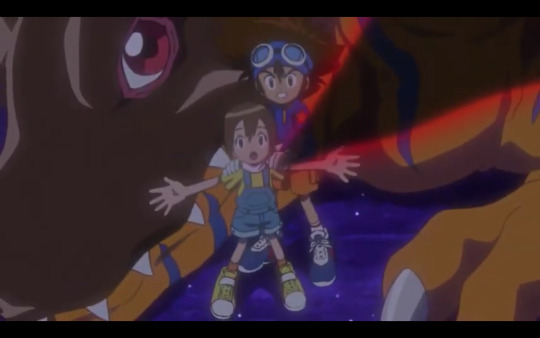
We get attacked by a scary looking Digimon and Hikari... Idk, thinks she can block the attack somehow? haha. Aw but look how awesome she is protecting her brother and Greymon!
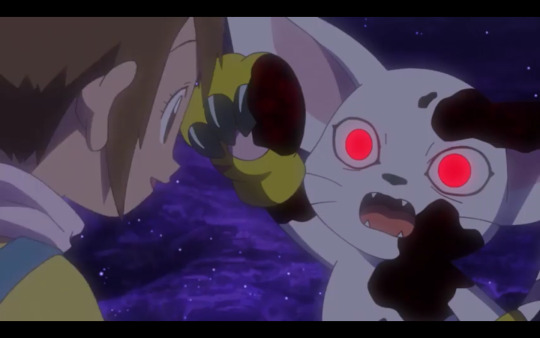
Hikari gets touched by the dark powers! Oh noes!
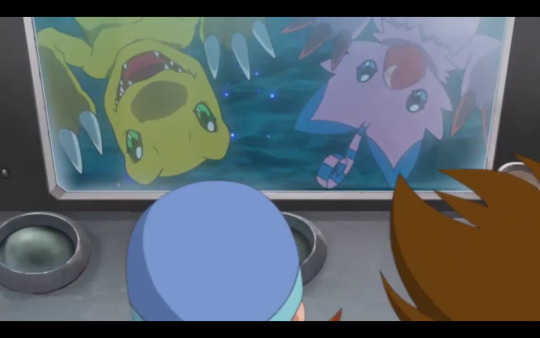
And more cuteness.
The episode title name-drops Angewomon, which surprises me because I figured they’d hold off on her and give Tailmon Nefertimon for an evolution first. But *shrug* whatever! Looking forward to it.
#digimon adventure reboot#digimon adventure:#digimon adventure 2020#fizz watches digimon 2020#digimon#digi spoilers
18 notes
·
View notes
Text
The Horror Movies That May Owe Their Existence To H.P. Lovecraft
https://ift.tt/2T7puxi
With Lovecraft Country finishing its acclaimed first season, you may be looking to fill that new gap in your viewing schedule with more content based on or inspired by the works of the enigmatic author from Providence, Rhode Island.
Let’s get one thing clear upfront: Howard Phillips Lovecraft was very much a product of his time and upbringing, and his views on race, ethnicity, and class — while commonplace for where and when he lived — were truly noxious, an aspect of his legacy that Lovecraft Country addresses in its own themes. But it’s also clear that Lovecraft was arguably the most influential horror writer of the 20th century, with a reach that extends to this day.
While there have been a number of movies based directly on stories by Lovecraft — including titles like Die, Monster, Die! (1965), The Dunwich Horror (1970), Re-Animator (1985) and its sequels, From Beyond (1986), Dagon (2001), The Whisperer in Darkness (2011), and Color Out of Space (2020) — you may be surprised just how many more readily available major horror films and cult favorites have been influenced by his writing in terms of plotlines, themes, mood and imagery.
cnx.cmd.push(function() { cnx({ playerId: "106e33c0-3911-473c-b599-b1426db57530", }).render("0270c398a82f44f49c23c16122516796"); });
Here is a readout of 20 movies, spanning the last 60 years, in which the pervasive presence of H.P. Lovecraft had an undeniable impact, making many of these efforts into mostly effective and often great horror films. Even the Great Old Ones would approve…
X: The Man with the X-Ray Eyes (1963)
Legendary filmmaker Roger Corman had just adapted a Lovecraft story in The Haunted Palace (although the movie was marketed as part of his Edgar Allan Poe cycle), but this sci-fi film also clearly channeled some of the author’s sense of cosmic horror.
Ray Milland plays a scientist who invents a formula that allows him to see through just about everything, eventually peering into the center of the universe itself. What he views there leads him to a shocking decision that fans of Lovecraft’s work would appreciate.
The Shuttered Room (1967)
This British production was based on a short story by August Derleth, Lovecraft’s publisher and a noted author in his own right. Derleth based his story on a fragment left behind by Lovecraft after the latter’s death, with the movie expanding on the tale even further.
Read more
TV
Behind the Scenes on Inside No. 9’s Most Terrifying Episode
By Louisa Mellor
Movies
Bram Stoker’s Dracula and the Seduction of Old School Movie Magic
By David Crow
Gig Young and Carol Lynley star as a couple who inherit Lynley’s family mill only to find something horrifying living at the top of the house. Lots of Lovecraftian elements — a cursed house, a family secret, and strange locals — are all here.
Alien (1979)
Lovecraft’s work arguably existed on that knife edge between horror and science fiction — the Great Old Ones of his Cthulhu Mythos were, after all, ancient entities that existed in the darkest corners of the universe.
One of the greatest sci-fi/horror hybrids of all time, Alien, clearly took a cue from Lovecraft’s work: the origins and motivations of its xenomorphs were utterly unknowable to human understanding, and even the look of the alien echoed the gelatinous, glistening flesh of the Old Ones (too bad later movies like Prometheus and Alien: Covenant ruined it by explaining far too much of the alien’s history).
Scorpion
City of the Living Dead (1980)
Italian director Lucio Fulci directed several films inspired by the work of Lovecraft, starting with this gorefest starring Christopher George (Grizzly) and Catriona MacColl. When a priest hangs himself on the grounds of a cemetery in the town of Dunwich (a town created by Lovecraft), it opens a portal to hell that allows the living dead to erupt into our world.
Read more
TV
Talalay’s Terrors! The Director Breaks Down Her 5 Scariest Scenes
By Kayti Burt
TV
Boy Meets World’s Slasher Episode Was Scarier Than it Had Any Right To Be
By Nick Harley and 1 other
Fulci’s movie is often nonsensically plotted and more reliant on gore than Lovecraft ever was, but the otherworldly, surreal atmosphere is definitely sourced from the master.
The Beyond (1980)
The second film is Lucio Fulci’s “Gates of Hell” trilogy (the third was The House by the Cemetery) is perhaps the most heavily Lovecraftian, with Fulci regular Catriona MacColl inheriting a hotel in Louisiana that turns out to be — you guessed it — a portal to the world of the dead.
Like the director’s other work, it’s inconsistently acted and directed, but it oozes with a surreal, unsettling atmosphere that almost becomes intentionally disorienting. Hell of an ending too — literally.
The Evil Dead (1981)
Sam Raimi was just 20 when he and friends Rob Tapert and Bruce Campbell set out to make a low-budget horror movie called Book of the Dead, based on Raimi’s interest in Lovecraft. The finished product, The Evil Dead, featured plenty of Lovecraftian touches: a book of arcane evil knowledge, entities from another dimension, reanimated corpses and more.
Read more
Movies
New Evil Dead Director Has Been to the Woods Before
By Don Kaye
Movies
Evil Dead Movies: The Most Soul Sucking Moments
By David Crow
It also became one of the greatest cult horror movies of all time, spawning an entire franchise and — even as it veered more into comedy — staying true to its cosmic horror roots.
Universal
The Thing (1982)
Even though it’s squarely set in the science fiction genre, John Carpenter’s brilliant adaptation of the 1938 John W. Campbell Jr. novella Who Goes There? (filmed in 1951 as The Thing from Another World) is unquestionably cosmic horror.
Read more
Movies
The Thing Deleted Scenes Included a Missing Blow-Up Doll
By Ryan Lambie
Movies
John Carpenter’s The Thing Had An Icy Critical Reception
By Ryan Lambie
Although the title creature lands on Earth in a spaceship, its immense age, apparent indestructibility, utterly alien intelligence and formless ability to shapeshift make it one of the most Lovecraftian — and terrifying — monsters to ever slither across the screen. The remote, desolate setting and growing paranoia among the characters add to the terror and awe.
Ghostbusters (1984)
Yes, it’s one of the best combinations of horror and comedy to ever emerge onto the screen. But Ghostbusters’ second half — in which an apartment building designed by an insane architect turns out to be a gateway to a realm of monstrous demons led by “Gozer the Gozerian” — is pure Lovecraft.
The monstrous nature of the menace, the ancient rites and secret cult used to summon it — all of this is still quite cosmically eerie even as it’s played mostly for laughs and thrills.
Prince of Darkness (1987)
The second entry in what came to be known as John Carpenter’s “Apocalypse Trilogy” is perhaps the least influenced by Lovecraft. But it still packs a cosmic wallop with its arcane secrets long buried in an abandoned, decrepit church, its portal to another dimension ruled over by an Anti-God, its mutated, reanimated human monsters and its mind-bending combination of religious legends and scientific speculation (credit as well to British writer Nigel Kneale, an even more massive inspiration here).
In the Mouth of Madness (1995)
Carpenter completed his trilogy (arguably his greatest achievement outside of Halloween) with the most Lovecraftian of the three, in which a private insurance investigator (Sam Neill) looks into the disappearance of a famous horror author and learns that his books may portend the arrival of monstrous creatures from beyond our reality.
Read more
Books
An Introduction to HP Lovecraft: 5 Essential Stories
By Ethan Lewis
TV
How Lovecraft Country Uses Topsy and Bopsy to Address Racist Caricatures
By Nicole Hill
Not only are the ideas right out of Lovecraft, but the movie oozes with allusions to the writer’s work and ends up being as disorienting and genuinely disturbing as some of his most famous stories.
Event Horizon (1997)
While we will always argue that the execution of this film was faulty, which stops it from becoming a true cult classic, we won’t debate its central premise: a spacecraft with an experimental engine rips open a hole in the space-time continuum, plunging the ship and its crew into a dimension that appears to be hell itself and endangering the rescue team that arrives to find out what happened.
Read more
Movies
Exploring the Deleted Footage From Event Horizon
By Padraig Cotter
Movies
Event Horizon: From Doomed Ship to Cult Gem
By Ryan Lambie
Director Paul W.S. Anderson provides some truly macabre touches to an often incoherent movie, and again the whole invasion-of-evil-from-outside-our-universe concept points right back to old H.P. and his canon.
Hellboy (2004)
Hellboy creator Mike Mignola has often cited Lovecraft as a primary influence on his long-running comics starring the big red demon (Lovecraft’s vision has impacted a slew of other comics over the years as well), and it’s no surprise that Guillermo del Toro’s original movie based on the books touches on that too. The film’s Ogdru Jahad are a take on Lovecraft’s Great Old Ones, while the movie is stuffed with references to occult knowledge, forbidden texts, alternate realities and more.
Del Toro’s own direct Lovecraft adaptation, At the Mountains of Madness, remains abandoned in development hell, but his work here gives us perhaps a taste of how it might have looked.
The Mist (2007)
Stephen King has often cited the influence of Lovecraft on his own vast library of work, and both the novella The Mist and Frank Darabont’s intense film adaptation are perhaps the most overt example.
While the premise is vaguely sci-fi — an accident at a secret government lab opens a portal to another dimension, unleashing a fog containing all kinds of horrifying monsters — the mood and the entities are Lovecraftian to the extreme, as is Darabont’s unforgivingly bleak ending (altered from King’s more ambiguous one).
The Cabin in the Woods (2012)
Director/co-writer Drew Goddard and co-writer Joss Whedon take on two of horror’s most criticized subgenres, the slasher film and the torture porn movie, in this sharp satire that ends up being a Lovecraft pastiche as well. The standard set-up of five young, horny friends heading to a remote cabin in advance of being slaughtered turns out to be a ritual performed by trained technicians as a sacrifice to monstrous deities — the Ancient Ones — that reside under the Earth’s crust. The ending — in which the survivors decide that humanity isn’t worth saving after all — would have met the misanthropic Lovecraft’s approval.
Stephen King’s It (2017/2019)
The more metaphysical elements of King’s gigantic 1987 novel (such as the emergence of the godlike Turtle and the journey into the Macroverse) didn’t really make it into either this two-part theatrical version of the novel or the 1990 miniseries.
Read more
TV
Upcoming Stephen King Movies and TV Shows in Development
By Matthew Byrd and 6 others
Movies
How It Chapter Two Differs from the Book
By David Crow
But the influence of Lovecraft is still felt in the title menace itself, an unimaginably ancient, shape-shifting entity that can exist in multiple realities and feeds on fear and terror. The way that It slowly corrupts the town of Derry and its inhabitants over the years has precedent as well in Lovecraft tales like “The Dunwich Horror” and “The Shadow Over Innsmouth.”
The Endless (2017)
Indie horror auteurs Justin Benson and Aaron Moorhead have touched on certain Lovecraft tropes in all their films, including Resolution and Spring, but The Endless is perhaps the most directly influenced by the author. The writers/directors also star in the movie as two brothers who return to the cult from which they escaped as children, only to find it has become the plaything of an unseen time-bending entity.
Genuinely eerie and more reliant on character and story than special effects, The Endless is a good example of what a modern twist on the Lovecraft mythos might look like.
The Void (2017)
A small group of medical personnel, police officers and patients become trapped in a hospital after hours by an onslaught of hooded cultists and macabre creatures in this virtual compendium of well-loved Lovecraft tropes and imagery. Writer/directors Steven Kostanski and Jeremy Gillespie channel an ’80s horror vibe, with all its pros (and some cons) but the overall atmosphere is surreal and the story taps effectively into the sense of cosmic horror.
Annihilation (2018)
Alex Garland’s (Devs) adaptation of Jeff VanderMeer’s frightening novel Annihilation is brilliant and terrifying in its own right, and both serve as loose rewrites/reinventions of Lovecraft’s classic “The Colour Out of Space.” In this take, four female explorers are tasked with penetrating and solving the spread of an alien entity over a portion of the coastal U.S. that is mutating all the plant and animal life within. The sense of awe and cosmic dread is strong throughout this underseen gem.
The Lighthouse (2019)
The second feature from visionary writer/director Robert Eggers (The Witch) is more a psychological drama than an outright horror film — or is it? The story’s two lonely lighthouse keepers (Robert Pattinson and Willem Dafoe) may be going insane or may be coming under the influence of an unseen sea entity and the beam of the lighthouse itself.
Read more
Movies
A24 Horror Movies Ranked From Worst to Best
By David Crow and 3 others
Movies
The Lighthouse: the myths and archetypes behind the movie explained
By Rosie Fletcher
With its black and white cinematography, windswept location, half-glimpsed sea creatures and sense of reality crumbling around the edges, The Lighthouse is just a Great Old One away from being a genuine Lovecraftian nightmare.
Underwater (2020)
It’s hard to believe that this Kristen Stewart vehicle came out in early 2020 — given the way the world changed since, it seems like it came out five years ago. Although its story of workers on a deep sea drilling facility battling monsters from the deep was an overly familiar one, the creatures themselves were more unusual than most. Director William Eubank took it a step further by saying that the movie’s climactic giant monster was none other than Cthulhu itself, the Great Old One sleeping under the ocean and namesake of Lovecraft’s entire Cthulhu Mythos — which takes us back to where we began.
The post The Horror Movies That May Owe Their Existence To H.P. Lovecraft appeared first on Den of Geek.
from Den of Geek https://ift.tt/34bCWqy
10 notes
·
View notes
Text
Bendy and the Ink Machine: "Dreams Come to Life"
Guess what I got my hands on!

My Rating: I'd say...about 3 out of 5 stars. Or a solid B/B-
I really wanted to like this book, and there were aspects that I did enjoy. It was a quick and easy read, the original characters were engaging, and the last 30-40 pages were great! Unfortunately, too much of the rest of it felt like an original coming of age novel had taken a wrong turn into a back alley where our favorite BatIM characters happened to be loitering, rather than a novel rooted in the source material. It was unfocused and, while neither side of the story was bad, trying to mash them together made the final product a bit unsatisfying.
(I probably don’t need to say this, but…spoilers below the cut.)
The Good, the Bad, and the Meh:
The Good:
Buddy, Buddy's family, and Dot. I liked the focal original characters, for what they were worth. The author did a good job of making the reader feel for them and put a lot of effort into making them well-rounded. We just spent way more time with them than necessary.
The Setting. Joey Drew Studios, Buddy's home, and New York as a whole. The story was descriptive in a very sensory way, really making you feel the heat in that long-ago New York summer and the visceral differences between Buddy's world and Joey's farce. This was also effective at highlighting differences between Buddy’s perceptions at the beginning and end of the book.
Joey. Joey is the one game character in the book that received a decent bit of exploration and development. Buddy's initial infatuation with Joey's empty promises and charisma giving way to cold facts and the creeping horror of realization about how twisted he actually is...that's interesting to observe.
Sammy, Norman, Tom, Allison, Henry. To be clear, Henry's not actually present. At all. But the few lines we get about him are almost as much as we get from the game characters that are working at the studio at the time of the novel. What tiny bits we get about them are nice, though! Especially Sammy and the final conversation between Buddy and Tom.
The Studio. It feels properly creepy and convoluted. Since Buddy and Dot spend a significant amount of time exploring it, the studio's atmosphere receives a lot more focus than many other parts of the plot. It doesn’t quite match the game studio’s layout, but that’s a nonsensical mess anyways.
The Meh:
The Ink Demon. I couldn't figure out whether to put this in the positive or negative bracket so I'm leaving it somewhere in between. "Bendy" is properly terrifying and twisted and there's something that hits you right in the gut when you find out it's locked up in a tiny room alone, howling mournfully, when Buddy finds it. Then it gets out and starts killing people and that sympathy goes away very fast. However, it doesn't really feel like the Ink Demon from the game. In the book, it acts like a beast when Buddy sees it but, when you actually stop to think about it, its actions don't make sense for an animal driven by instinct. What is it actually doing most of the time? This might be a sign that it changes between the time of the novel and the game, but its actions in the novel are so contradictory that I think it’s a mistake. So....it's good as a typical PG-13 horror monster, but it doesn't feel like the Ink Demon, or "Bendy", despite the descriptions.
The Subplots. The many, many subplots. Don't get me wrong, I like Buddy, but hyper-focusing on him so much was extremely detrimental to the rest of the story. He had about six different things going on in his life and the first person POV meant the reader was stuck with him for every second of it. This brings us to the biggest problem in the novel and the cons section.
The Bad:
Buddy's Story. Thing is, it isn’t bad. It's a coming of age story about an artistic kid from the wrong side of town trying to find himself in post-WWII New York. It just...has nothing to do with Bendy and the Ink Machine. Even when Buddy is hired by Joey, there's about one page of studio investigation for every ten pages of Buddy's personal life struggles. It felt like the author started writing the first plot then tried to cram Bendy and the Ink Machine into it later on. And it really feels like the author cares more about the coming of age novel than the Bendy/Studio stuff. Joey was a key figure in the book but it was less about his madness driving the studio to ruin and more about Buddy trying to find a role model/mentor and being let down hard. (All of this is until the last forty pages or so, until Buddy talks to Tom and Allison at the party. Then it FINALLY feels like a BatIM book.)
The lack of time spent with the BatIM characters other than Joey. I liked what little we got of them, but I swear there were maybe ten pages, combined, of their roles in a book that was almost 200 pages. That includes Norman, Sammy, Tom, and Allison. Sammy might have gotten a bit more simply because Buddy thought about him a lot, but he wasn't actually present any more than the others, he just got name-dropped more often.
The limited first-person perspective. There are plenty of cases where this is a good choice, but in this book, it was very restrictive. Buddy didn't know much, wasn't interested in knowing much, and didn't focus on the things that the reader found most interesting. We all understand needing to make money to care for our loved ones, but he’s working in an increasingly demonic (haunted?) animation studio. Focus, Buddy! Every time the plot seemed to be teasing something interesting, Buddy ran away from it and, since we were tied to him in first person, we never got to see what happened after he left. If we’d cycled between characters in first-person, that would have been a different matter…but we didn’t.
The lack of Bendy. And Boris. And Alice. Buddy wants to draw, clearly, but most of the time, he just talks about learning to draw and wanting to make cartoons. The subject matter doesn't seem to be important, so even though we're in Joey Drew Studios, Buddy rarely talks or thinks about the titular character beyond lines on a page. The entire book, 'Bendy' just felt like a name dropped every now and then, not the beloved 'dancing demon'.
Buddy's Fate. Getting turned into Boris, I can accept. It's the rest of it. The whole "I took off into the depths of the studio where not even Joey Drew could find me and I watched as it grew and changed, then I decided to write this for Dot.". What? WHERE did he stay? And WHY? Joey was still sacrificing people, and he did nothing to stop it? What was he eating, if bacon soup wasn't all over the place yet? How did he remain undetected in the pre-warped studio? He had family - did he not try to contact them? What about Dot? She still worked there and understood what was going on - he never tried to talk to her? Send her a note? ANYTHING? Why did he write the book AFTER the studio was abandoned? On the face of it, this is a weak resolution, but it's actually worse – all of this is completely out of character for the Buddy we've come to know during the novel.
The whole 'mentally turning into Boris' thing. I get that Buddy's writing a retrospective, but we get a few paragraphs of rambling about his mental state every five chapters or so and it's never consistent – Buddy’s voice is the same the rest of the time, no matter how much he says he’s slowly sliding into Boris. It just serves to remind the reader that they're reading a BatIM prequel. It would have been a better choice to put a longer introduction from his human perspective in the beginning and a fragmented, more 'Boris' follow-up at the end to show the degradation of Buddy's mind.
*Sigh*
It would have been so much better if the author had followed a character more invested in the studio instead of their own life. If it had to be an original character in the current book, it should have been Dot. Better yet, it should have been Tom or Norman – they are both well-known game characters who were personally involved in the horrors going on behind the scenes and Norman came to an end just as bad as Buddy's. Plus, they would have been more focused on the game characters rather than the original characters.
I got the ebook for about $5 and I don’t regret buying it, but I probably won't read it again.
In Short:
The last 30-40 pages were great and everything you could want from a Bendy and the Ink Machine novel. The rest of it read like the author was trying to Frankenstein together a coming of age novel and a short horror story without much success. Other than Joey, that is; the 'unscrupulous, delusional businessman who pushes too far' character fit well into both sides of the story.
#Bendy and the Ink Machine#BatIM#Dreams Come to Life#I kind of want to write a fanfic fixing these problems#Cycle between the perspectives of the named characters#Could even keep most of the plot#Just keep the focus on the BatIM part of it#It all comes back to the lack of focus#doesn't it?#Also#where was Wally for all of this?#Book Review
1 note
·
View note
Text
Hymnstoke XV

GC: TH3Y 4LL THOUGHT 1 W4S CR4ZY
GC: BUT H4H4H4 1T TURN3D OUT W3 4LL W3R3 1N OUR OWN W4YS
GC: TH4T H3LP3D US R34LIZ3 TH3 P4RTICUL4R D3ST1N13S THE G4M3 PUT TOG3TH3R FOR US
GC: 1N TH3 VOC4BUL4RY OF L1K3
GC: TH3 HYP3R FL3XIBL3 MYTHOLOGY 1T T41LORS TO 34CH PL4Y3R GROUP
Bildungsroman.
I think the term "bildungsroman" (or its less-pedantic equivalent "coming of age story") is over-employed in contemporary critical analysis. It's a lot like the term "deconstruction," which can be draped atop a wide variety of stories to ostensibly make a critical statement without saying anything.
Hussie himself, in one of his old Formspring posts, described Homestuck as a "coming of age story." But who exactly is the one coming of age? Obvious answer is John. The story opens with him on the cusp of adolescence (thirteenth birthday) and ends, at least in one Epilogue, with him reconciling with his estranged wife and child. Obviously some coming-of-age has occurred, even if only literally. But in what way has John developed as a person? Is that development stymied by the existence of a parallel Epilogue in which he unceremoniously dies, or does even that branch of John's existence feed into who John becomes as a person?
I've only read the Epilogues once, so my thoughts on that part of the story probably won't be fully realized until I reread them at the end of this blog. Rooting myself purely in the current moment of Act 4, however, I can still discuss certain aspects of John as a character. I mentioned in previous Hymnstokes his beginning as a naïve, blank slate reader-surrogate who blindly fumbles his way through uncertain situations. His trajectory has been away from this initial naivete toward cynicism—or "irony" if you will—a more cautious, guarded approach to his understanding of the world around him. The main moment of development so far has been his foray into his Dad's room, which revealed to him that his Dad "isn't all that into clowns you guess." But I don't think it's until John's interactions with Vriska in Act 5 Act 2 that he's going to reach the done-with-this-shit, rolling-my-eyes attitude he possesses throughout Act 6. (And it's funny, because even when he takes on that attitude, he still serves as reader surrogate—as if the reader, too, sees what was once novel and wonderful as obnoxious and stupid—but that's for a discussion of Act 6 as a whole.) So that's John's coming-of-age "arc."
Which feeds into a larger discussion about duality, because as I mentioned previously Dave is moving in the opposite trajectory, away from irony and toward sincerity. Rose is moving away from scientific analysis and toward occult spiritualism, while Jade—well, Jade never really gets a "character arc" because she's more of a plot device than a real character. But Jade, functionally, begins as a spiritual prognosticator whose seemingly supernatural facets all eventually become explained by rudimentary technical features of the SBURB game.
The reason why I think describing Homestuck as a "coming of age story" is reductive is because while these young characters do develop (or at least change), these developments crisscross one another, lead to innumerable dead ends, and fail to satisfy the characters themselves. I would argue that almost all of the characters are more insecure, or even more immature, at the end of Homestuck than at its beginning. The thirteen-year-old versions of these characters speak with the vocabulary and understanding of a reasonably well-read 30-something dude, employing witty barbs and clever sentence constructions left and right as they empirically sort out the unfamiliar game world of SBURB to satisfactory results. They have "problems" with their parental figures, they don't "understand" themselves, but they are competent people capable of progressing despite immense challenges hurled their direction. The major failures of the B1 SBURB session are caused by the meddling of the trolls, not imperfections in John, Dave, Rose, or Jade. In fact, the kids' concerted, Herculean efforts to create a clockwork Cascade of perfectly-placed mechanisms are what salvage an otherwise hopeless situation.
Yet in B2 it all goes to shit, and John and pals wind up being totally useless despite having far more advantages than they did in the B1 session: three years to prepare, foreknowledge of the game's mechanics and even the specific situation of the B2 SBURB they are entering, being literal gods, retcon powers, et cetera. It's almost as if, rather than "coming of age" and "developing into adults," the kids undevelop, unmature, regress, fall apart, decay...
Kind of like entropy.
So if the characters themselves are progressing in these crisscrossing dualisms, irony versus sincerity, science versus faith, then the development of the characters as a whole is crisscrossing the development of the plot: Degeneration versus regeneration, destruction versus creation. In a way, these characters are relics of the world they left behind: that saturated, useless Earth. They are products of its cultural detritus, and while their aim is to create a world from its fragments, they themselves are among those fragments. In the Epilogues, their intrusion into the world they created hurls that world into chaos, and the Meat epilogue ends with them extracting themselves from a place in which they do not belong.
GC: 4CT1ONS TH4T COMPL3T3 LOOPS 1N TH3 T1M3L1NE
GC: COGS 1N P4R4DOX SP4C3
TT: Paradox space?
GC: OH H3LL
GC: L1ST3N TH3 UN1V3RS3 W1LL 34T P4R4DOX3S FOR BR34KF4ST
GC: 4ND SO W1LL TH1S G4M3
GC: G3T US3D TO 1T
GC: BY NOW YOU SHOULD R34L1Z3 TH1S WHOL3 M3SS W4S 4 B1G S3LF FULLF1LL1NG CLUST3RFUCK
GC: A HUG3 ORG14ST1C MOB1US DOUBL3 R34CH4ROUND
Or are the linear tracks of character development I described actually part of Homestuck's favorite structure, the mobius loop? Is the duality between irony and sincerity, science and magic not actually a duality, but two sides of the same one-sided shape?
Because the path of Homestuck might also be read not as a linear rise and fall, but a series of loops. John and pals degenerate in early Act 6, only to renew again after GAME OVER when Vriska sorts everything out and they have a huge pow-wow before the final fight. Yet they degenerate again in Epilogues, falling apart at times even more pathetically than they did on the three-year plane ride to the B2 session, only to finally reach a semblance of resolution at the end of either one Epilogue or the other. But even the ends of those Epilogues suggest a lack of finality, a way for the story to continue, more development upward or downward to be had.
A series of Ascents and Descents. It fits the naming structure employed for many key moments in Homestuck. But what does it mean? Why does it matter that Homestuck is structured this way?
Thomas Pynchon, that nefarious postmodernist, was a writer overtly concerned with entropy, given his background in science and engineering. He once wrote a short story about another one of his favorite interests: parties, bro. In this story, a group of young people are partying in a house. Having fun, drinking, all that young kid stuff. But as the night draws to an end, the energy disperses, everyone becomes tired and lazes about. The closed system of the party has succumbed to entropy. At the end of the story, someone opens a window and a breath of fresh air revives everyone so that the party can continue.
On a universal level, entropy is irrevocable. Eventually, millions or billions of years in the future, heat will disperse throughout the universe; no more stars, no more solar systems, only a cold expanse of space. But in a closed system, entropy can be easily overcome by opening the system and letting in energy from outside, the way it worked in Pynchon's party story.
In an earlier Hymnstoke, I exuberantly declared that Homestuck overcomes entropy. My argument was that, by making meaning out of meaningless cultural detritus, Homestuck resolves the problem of societal decay famously put forward by T.S. Eliot in the poem The Waste Land. That conclusion may have been overeager, especially in light of how Homestuck ends both in Act 7 and the Epilogues. But I think viewing Homestuck through this post- or post-postmodern lens of entropic decay sheds some insight on what exactly those tricky Epilogues mean.
Paradox Space appears to be a closed system that overcomes entropy. It can go both up and down despite being closed. It continually chews up and recycles its own parts to continue its progression, similar to how Hussie brings back seemingly irrelevant details to create meaning later. As characters state innumerably throughout the story, everything in Paradox Space is a "S3LF FULLF1LL1NG CLUST3RFUCK," designed with the sole intention of continuing the existence of Paradox Space.
But Paradox Space cares nothing for the existence of its constituent parts beyond what they can do to further itself. And because of this, the characters, while trapped within Paradox Space, cannot truly progress. They go up every time they go down, down every time they go up. Every state of maturity breaks apart into a state of immaturity, every revelation or self-understanding is later reframed as a shortsighted false epiphany. Eventually, like John at the end of the Meat epilogue, they are unceremoniously mulched so that Paradox Space can continue.
Where's the escape? In a world where the worth of an individual is only how much use can be drained out of them until they break, how does the individual "come of age"?
I think, moving forward, I'll keep a closer eye on how each character interacts with Paradox Space, that unseen clockwork machinist putting all its cute pieces together for the sake of continuing itself. If Homestuck is a "coming of age story," I do not believe it has an altogether positive view on the ability of children to mature and develop. Hussie may have intended it to at an earlier stage of Homestuck's creation, but that was PAH, Past Andrew Hussie. It has been, what, seven or eight years since that Formspring post?
TT: I'm starting to see that.
TT: So the exiles are on Earth? Does that mean our goal is to get back there too? To resurrect it somehow?
GC: NO NO NO
GC: S33 1RON1C4LLY TH3Y G3T TO DO TH4T
GC: 4FT3R TH3YR3 DON3 H3LP1NG YOU TH4T 1S
GC: YOUR JOB 1S OF GR34T3R CONS3QU3NC3 TO S4Y TH3 L34ST
GC: BUT P4RT OF TH31R JOB 1S TO R3BU1LD L1F3 4ND C1V1L1Z4T1ON TH3R3
GC: 4ND 1F TH3YR3 SUCC3SSFUL 1N THOUS4NDS OR M1LL1ONS OF Y34RS TH3 T3CHNOLOGY 1S UN34RTH3D 4ND TH3 PL4N3T 1S R1P3 FOR S33D1NG 4LL OV3R 4G41N
Oh hey, rebuilding and reseeding. Even the dead planet gets recycled so that another session of SBURB can begin.
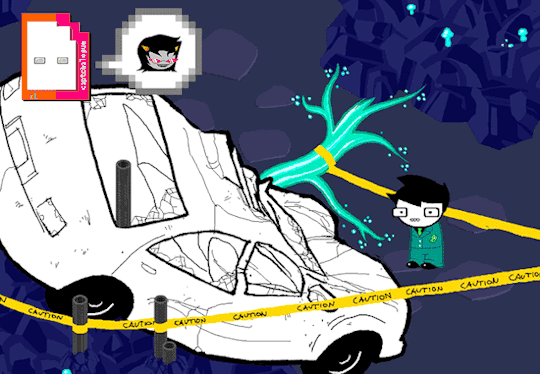
(End of Meat epilogue, 2010 colorized.)
GC: 1M MOT1V4T3D BY S3LF 1NT3R3ST
GC: TO H3LP YOU 4DV4NC3 MOR3 QU1CKLY
GC: B3C4US3 1V3 GOT YOUR WHOL3 ADV3NTUR3 R1GHT H3R3 1N FRONT OF M3
EB: do you have a braille screen or something?
GC: SHHHHHHHH!
GC: 4NYW4Y TH3 PO1NT 1S
GC: 1TS LONG AND BOR1NG
GC: 4ND YOU COULD ST4ND TO SK1P SOM3 ST3PS
Vriska will eventually take on the role Terezi is performing here, but this exchange hearkens back to what I was talking about in the previous Hymnstoke about "skipping to the end." Doing it here gets John killed, because of course this skip is meant to "FUCK UP TH3 T1M3L1N3." At other times, screwing with the timeline is exactly what the timeline requires, so it is allowed in that instance (and it's even allowed in this instance because the doomed timeline created here allows the main timeline to progress in a necessary way). The concept of temporal causality, introduced in the Intermission, becomes more explicit in this episode with Terezi and John and the jetpack. Where Spades Slick and the Felt played by temporal rules, John will not, and the consequences for those actions will be revealed, as well as the harsh truth: the individuals within the system have no choice; the system commands their actions.

GA: I Just Would Like To Gather
GA: Some Means Of Gauging Her Sincerity
TG: ok well its easy
TG: for everything she says take her to mean just the opposite
TG: see not everybody always means literally what they say the way john and jade always do
GA: Maddening
GA: How Do Humans Forge Meaningful Relationships Using Such Communication Patterns
GA: Perhaps It Is The Human Riddle That Is Truly The Ultimate Riddle
While this quote touches on the irony versus sincerity angle as it pertains to the kids, the reason I bring this passage up is: What the hell was the Ultimate Riddle? I completely forget if it was ever meaningful whatsoever. Did it get answered? Does it even show up after Act 5? Act 5 (and Act 4, its prelude) is so divorced from everything that comes before and especially after it. Act 6 gleefully forgets anything that happened in Act 5, and the Ultimate Riddle is only one of its many casualties.
I guess if you slap something into a story called "the Ultimate Riddle" you're going to provoke people to try and answer it, even if the riddle lacks any substance whatsoever.

GC: TH3 HO4RD CONT41NS SO MUCH MOR3 GR1ST TH4N YOU COULD 3V3R US3 1N 4N 4LCH3M1T3R
GC: 1 M34N YOU COULD 1 GU3SS
GC: BUT TH4TS NOT TH3 PO1NT
GC: 1TS FOR TH3 ULT1M4T3 4LCH3MY
EB: what's the ultimate alchemy?
GC: 1TS NOTH1NG FOR YOU TO WORRY 4BOUT NOW
I think the Ultimate Alchemy also doesn't matter? I don't remember it, at least, although maybe it had more of an answer than the Ultimate Riddle. I think SBURB as a game doesn't matter all that much, that a lot of it is, eventually, skipped Vriska-style. (Maybe the Ultimate Alchemy created Caledfwlch? I seriously forget.)

JASPERSPRITE: Rose im just a cat and i dont know much but i know that youre important and also you are what some people around here call the Seer of Light.
JASPERSPRITE: And you dont know what that means but you will see its all tied together!
JASPERSPRITE: All the life in the ocean and all the shiny rain and the songs in your head and the letters they make.
JASPERSPRITE: A beam of light i think is like a drop of rain or a long piece of yarn that dances around when you play with it and make it look enticing!
JASPERSPRITE: And the way that it shakes is the same as what makes notes in a song!
JASPERSPRITE: And a song i think can be written down as letters.
JASPERSPRITE: So if you play the right song and it makes all the right letters then those letters could be all the letters that make life possible.
JASPERSPRITE: So all you have to do is wake up and learn to play the rain!
God damn, we are just going on a tear of "shit that is introduced like it's important but turns out to be not important at all." I recall in particular several people were annoyed that Rose never "played the rain," that it was a point foreshadowed but never acted upon. But rereading this story from the viewpoint of knowing what is and isn't resolved, I think it's no accident that all these game concepts (Ultimate Riddle, Ultimate Alchemy, play the rain) are introduced in such rapid succession and all wind up not being that relevant. The quantity of these esoteric terms undermines their ostensible quality; when faced with Ultimate This, Ultimate That, the reader fails to affix narrative importance to all of it. And because all these things do, in fact, wind up being barely relevant (if relevant at all), this stylistic presentation turns out to be entirely appropriate. Of course, these pointless Ultimate Whatevers are framed against the backdrop of John "skipping to end," so the concept that certain things might not be important should already be implanted in the reader's mind.
Does that make Paradox Space not as efficient as it seems to be? That's one interpretation, but here's another, based on a point I made previously: What is important for Paradox Space is not important for the characters. Paradox Space can put forth an Ultimate Riddle, and to Paradox Space that riddle may, in fact, be important. But it's only more jumbled detritus to the protagonists, a collection of obscure terms that are ultimately less important on their personal paths than, say, Con Air. And this fact might suggest that creating your own path ("skipping to the end") might be more important than following the preset path laid out for you, the path created by the system (society, biology, your parents, the government, whatever you consider the "system" to be). John's jetpack excursion fails. But it wasn't his idea to skip ahead anyway, it was Terezi's. He wasn't following his own path. Hence, his failure.
However, in this Jaspersprite instance, "irrelevant" is not a completely fair assessment. A song that can be written down as letters? The letters can make life possible? Jaspersprite also says this:
ROSE: Jaspers, the message you gave me years ago before you disappeared...
ROSE: What did you mean?
JASPERSPRITE: Meow.
ROSE: Sigh...
JASPERSPRITE: :3
ROSE: I don't understand.
M, E, O, and W are the four letters that represent GCAT and become essential later in Act 5 for creating Becquerel (if I'm remembering correctly). I think it's those letters that Jaspersprite refers to when he tells Rose to "learn to play the rain," meaning this mystery, at least, is not only relevant but was resolved long before things in Homestuck stopped being resolved.
12 notes
·
View notes
Text
I finished Life is Strange: Before the Storm Episode 3.
Thoughts below the cut...
-spoilers for Before the Storm and Life is Strange-
In a lot of ways, it was very close.
I think Deck Nine have done an incredible job with telling a story that essentially didn’t need to be told. I appreciate the effort and dedication to make it feel like the same Arcadia Bay we’re familiar with. I love that it’s embellished further in some places, even when it’s just hinting at something. I’m truly grateful for some of the ways that Before the Storm has augmented its predecessor. And I’d like to give HUGE praise to Rhianna Devries for delivering a great performance as Chloe.
There is a lot to like in this game - though I think it became weaker with each episode.
The main plot pieces of the previous episodes rely a bit on their promise of a big payoff, and that sadly isn’t here in ep. 3. In the first episode’s ending, the mystery woman sits and smiles as a wildfire blazes. Mid-ep. 2, she exits Frank’s van, turns, and gives Chloe an unsympathetic look. By the end of that episode, she’s revealed to be Rachel’s birth mother, and when we discover her backstory in ep. 3, we find out she’s a recovering addict and just wants to meet her daughter. All these elements, to me, were speaking of a deeper conclusion than what we got. We’ve seen fragments of a manipulative nature in Rachel - how much of that is an inherited trait? What was Sera’s involvement with Damon and Frank if she claimed to be sober? Where was all this leading to?
When we finally encounter her properly, she’s a damsel for us to rescue, and when we converse, she’s only used to re-affirm the father’s plea - to cast more immediate doubt onto the final choice. I didn’t see the ending where she reunites with Rachel, but I saw that the timestamp on youtube puts it at 48 seconds of content, so I can’t imagine she’s elaborated on much, there.
It’s a shame because I think there was a lot of strong storytelling being done on the Rachel angle, and I felt that having a plot that wasn’t too connected to the original game was the right move. But all-in-all it pulled too much focus away from Chloe.
I’ve talked about why I was finding choices difficult in this prequel. How I felt conflicted about what Chloe would do, vs what I thought was best for her, vs where I knew the story would eventually end up. The final choice echoed this, too. In an odd way I found this one more difficult than the final choice of LiS. There, I knew there was no way I’d let go of Chloe. But here, even though the consequences were less severe (read: void, since we know it changes nothing), I still found it tricky. The story had been leaning very heavily on protecting Rachel from the truth in this episode, to the point where it practically seemed unavoidable. I remembered Chloe’s graffiti from the original game: ‘everybody lies, no exceptions’. I pondered on Chloe’s insecurities and inability to face hard truths. So I picked the lie.
And then I immediately remembered how hurt Chloe is when she discovers Rachel had been in a secret relationship with Frank. How she trusted Rachel with everything and no-one else. How isolated they both were. I sat with my decision and watched those events play out, while already planning to replay the whole episode just to alter my final choice.
Which I did. And while I felt picking the truth was in line with my version of Chloe, I was let down by the ending. I was let down when everything played out almost exactly the same.
There was a lot of hubbub about the first game’s ending - receiving criticism for not taking your choices throughout into account. While I understand the sentiment, this wasn’t a huge factor for my opinion on the final choice. What I appreciated about it (compared to games like The Walking Dead S1, and The Wolf Among Us) was that the endings were notably different from one another. This style of game seems built on choices that are arguably meaningless, but Life is Strange gave us one that mattered - a final branched path.
Before the Storm clearly took the criticism of the first game in mind and tried to craft the endings to avoid that. But in doing so, it became an ending with even less meaning, at least for me. Instead of the final choice leading down severely different roads, all it changes is how the closing montage begins. Does Rachel sit with her family, happy but oblivious? Or do her parents argue and punish themselves for her learning the truth? The rest of the montage scenes are either unchanged or specific only to earlier choices. It left me unsatisfied because it turned it all into one grey ending. It became the end of an episode, not the end of the full game. It made me feel like the final, most important decision was just one more yes/no option.
I get why it’s like this, and I get why from a production standpoint, any more nuance wouldn’t be feasible. But I wish there had been something more to both decisions. I think it’s really great that there is an epilogue for each of the smaller stories, that change depending on how you played them. But they need to be second-tier to Chloe and Rachel’s epilogue - all of which remained the same, save for the beginning.
I would have liked to see a callback to the wildfire, somehow. There’s a moment in the hospital where a firefighter mentions that it simply put itself out. Another small hint to the supernatural aspect of Rachel. I loved all these little hints, and I loved that they never trespassed too far over canon or over Chloe’s journey. But to better solidify the different endings, maybe it could have been played with more. If you tell Rachel the truth, the fire surges up again from her torment. And if you lie, it extinguishes fully, calmed by her ignorance, maybe we see some green returning to the park... or maybe it’s put out by a sudden onset of rain. The fire is over, but the storm is coming.
I’ve been trying to think what I would change about this game, even in small ways, that would make it overall a stronger piece of LiS story. I think I would have given Frank’s role to someone else - probably someone new. A few of the reappearing characters from the first game felt forced in solely because we knew they were familiar with Chloe before she reunited with Max, and while I appreciate the attempt to have Frank break out of that cameo feeling, I actually think he would have been better off on the sidelines. His portrayal in this feels inconsistent and uncharacteristic to how we meet him in the original. Here, he protects Chloe from a villain with a knife, while in his first scene in LiS, he pulls a knife on her. I think if they’d kept Frank in the margins, with more of that drug dealer presence, and given his role to, say, Thunder the bouncer, or even someone entirely new, the narrative would have been stronger. It would allow them to keep Frank true to Chloe’s later opinion of him, and also keep the players guessing as to the fate of this new character. There’s no threat when Frank is grappling with Damon because we know he survives. But with someone different, heck, maybe if you choose badly then they are actually put in danger.
I’m don’t like looking at this as an alternate timeline - I think that’s sorta unfair to Max’s role and influence on the story. So as far as recurring characters go, I think Joyce and David are used the best, both in consistent portrayal and how they affect Chloe here.
Due in part to their indeterminate fate, I think it’s BtS’s original characters that stand out most for me. I had a lot of fun interacting with Steph and Mikey, and figuring out how to handle the Drew situation. Skip’s story was cute, and it was cool to see Samantha involved with a pre-established character. Just a shame that most of this was sidestory stuff or inconsequential.
I’m glad they took Eliot in a different direction from Warren, though I’m not really sure what it was they wanted, there. A consistent theme in the game is the subtle and sometimes overt ways that Rachel manipulates people to get what she wants, and how Chloe’s regard for her is potentially hurting as much as it is healing. Eliot confronts Chloe about this directly, but it soon spirals into his ulterior motives and he becomes a threat. While I thought this was consistent with the way he’d been portrayed in earlier segments, and I understand that villainising that opinion works to delude Chloe further - I also wonder if it would have been more interesting to have Eliot genuinely concerned for her safety. I wonder what sort of player choices we would be given in that situation, and if the developers could still have convinced us to side with Rachel.
I think setting this story over three days was a mistake. I had this same feeling in the first game, but the reason it worked there was because Max and Chloe were reuniting. There were years of backstory that were coming up to the surface in that short week, and so all the events, all the emotions, had that much extra weight and believability because of it. Rachel and Chloe however, are meeting essentially for the first time, and their budding connection feels rushed over the course of BtS - culminating in Chloe making life-changing decisions for Rachel and risking her own life on day three of knowing her. Maybe it was intentional - maybe this was to exemplify the irresistible magnetism of Rachel. But I still think if it had been set over three weeks or even three months, there’d be more room to accommodate the relationship. As it stands, it’s all too close to Max and Chloe, with none of the history that makes it effective.
The post-credits sting just felt... mean. And not in a clever, foreboding way. If they wanted to close out with a reminder of where the story goes, they could do it with rumbling thunder, or a rain cloud off the coast of the lighthouse. Because this game wasn’t called ‘Life is Strange: Before Rachel Gets Kidnapped and Killed’. Rachel was more than her fate, and so was the original game. That ending put me back in the worst place that the first game takes you, and that just upset me.
I’m... not actually sure what Life is Strange is without Max. Maybe that’s why this game felt like it couldn’t ever truly hit the mark for me, even with my grievances over the original. Even though it was a game about saving Chloe, LiS was all told through Max’s lens - often literally. The parts of BtS that I was latching onto most were those that mentioned her. Chloe’s journal, her old texts, the dream segments...
And while I’m on that subject - I felt the metaphors got a bit confusing in this episode. My understanding of William’s dialogue in ep.2′s dream segment was a warning of the burning passion Chloe felt for Rachel (the fire), and a promise of the stronger connection to come with Max (the stars). Yet in ep.3, stars are also connected to Rachel, making her the storm, the fire, and the night sky. I just... felt like we lost a bit of focus there, or maybe I just interpreted it wrong. And was the Raven kinda absent from most of this ep?
I’ve been considering doing another full playthrough to see if anything becomes clearer, this time with all different choices (something I found impossible in the original LiS). We’ll see. I’ll let it rest for now, and see what ‘Farewell’ brings.
Even with all my hangups about both games, it’s always a shame to leave that world. There’s so much I love about it just on sensory levels.
My favourite moments from this episode were:
-Sera’s backstory. Loved the callback to the viewfinder.
-Playing tabletop again. I teared up when the story began reflecting the LiS ending.
-Seeing Chloe happy, even if it’s temporary.
Deck Nine pulled the weight with this game. While I’d predicted I would come away conflicted no matter what, I’m still thankful for the parts that they got right.
Wishing and hoping for great things to come.
As always, thank you to anyone who took the time to read these thoughts. Here’s a drawing <3
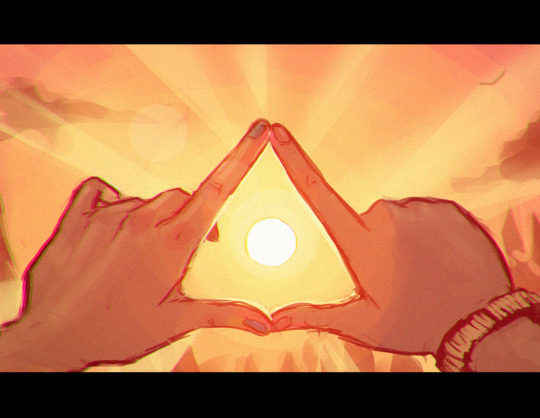
71 notes
·
View notes
Link
In Syria, music runs deeper into the fabric of the place than anywhere else in the world.
Long before the modern state was formed in 1946, Syria had developed rich musical traditions over thousands of years. The diverse religions, sects and ethnicities that inhabited and travelled across the country over the millennia – Muslims, Christians, Jews, Arabs, Assyrians, Armenians and Kurds, to name but a few – all contributed to this eclectic musical heritage.
This media cannot be played on your device.
Songs of ancient Syria
In the 1950s, archaeologists found 29 3,400-year-old clay tablets in a small cubicle – likely a library – in the ancient port city of Ugarit on Syria’s Mediterranean coast. They were mostly broken into tiny fragments, but one, which came to be known as H6, remained in larger pieces. Inscribed on it were lyrics, and underneath them is what researchers believe is the earliest example of musical notation anywhere in the world.
You may also be interested in:
• The world’s oldest centre of learning
• Where algebra was invented
• The dessert that’s blocked at borders
These shards of clay are the beginnings of an incomparable musical heritage.
Academics have spent years literally piecing together the tablets, trying to work out what was written on them, what it meant and how the musical notation might sound were it to be played again. The text is in Babylonian cuneiform script, a system of writing that spread throughout the region several millennia ago.
We could read the script… but we didn’t have any idea what it meant
“The problem with this tablet is that – we could read the script because it was written in Babylonian cuneiform, and we know the value of the signs – but we didn’t have any idea what it meant,” said Richard Dumbrill, professor of archaeomusicology at Babylon University in Iraq, who has worked on the Ugarit tablets for more than two decades.
Dumbrill described how he attempted on many occasions to reconstruct the Ugarit tablets in order to translate the text and music inscribed on them: “I took photographs and I tried to build them as a puzzle, but some had been damaged beyond reconstruction.”
View image of Markings on a 3,400-year-old tablet could be world’s earliest example of music notation (Credit: Credit: Leila Molana-Allen)
The translation difficulties were a product of the text being written in a language known as Hurrian from the north-east Caucasus, probably in modern-day Armenia, but which ended up in Syria’s fertile lands.
“These people migrated towards north-west Syria – it took them a good couple of thousand years – and decided to use the Babylonian signs to write their text and their music,” Dumbrill said. “So it was extremely difficult to translate. However, I managed to find out that the text below the two lines were musical names that were Hurrianised – that is, they were Babylonian but had been transformed on contact with the Hurrian people. And I could find out that it was a melody. It took me about 20 years to translate.”
So what does the earliest musical composition tell us about the people who lived at that time? From Dumbrill’s translations, he believes they had catalogues of songs for occasions of all sorts and moods, not just hymns for religious events.
One song details a bar girl selling beer to her clients, but the tablet known as H6 details a more sober story.
“It’s about a young girl who cannot have any children; she thinks that the reason is because she misbehaved in some way, which is not mentioned,” Dumbrill said. “And from what we can understand of the text, which is quite limited, she goes at night to pray to the goddess Nigal, who was the goddess of the moon. She brings a little pot of tin with sesame seeds or sesame oil in it, which she offers to the goddess, and that’s all we know about the text.”
View image of H6 was the beginning of Syria’s incomparable musical heritage (Credit: Credit: Leila Molana-Allen)
An ancient musical workshop
But Syria did not produce only the earliest melody. Over time, a rich array of musical instruments on which to play them also formed across the region, such as the lyre, a stringed musical instrument with a yoke and a crossbar, and lutes, which evolved into the modern Arabian oud, a teardrop-shaped plucked string instrument that produces one of the most evocative sounds in the region.
At Mari, an Early Bronze Age city-state on the banks of the Euphrates river in eastern modern-day Syria, researchers in the 20th Century uncovered a number of records detailing the musical instrument-making business of the time.
“There in the palace [at Mari] we discovered a huge number of tablets which were mainly letters and receipts of material from artisans who were requesting leather, raw hide, wood, gold and silver for making instruments,” Dumbrill said. “Therefore we have a very good idea about the instruments that were made about 4,000 years ago. We knew the names of the artisans, we knew the type of instruments they made. They were already influenced by instruments which were not Syrian,” he added, citing the Iranian parahshitum as an example, a type of lyre that became very popular among the girls of the harem at Mari.
Production of musical instruments continued to flourish in Syria over the centuries, and many are preserved in collections open to visitors today.
View image of The Debbané Palace in Saida, Lebanon, houses a rich collection of Ottoman-era musical instruments (Credit: Credit: Leila Molana-Allen)
At the Debbané Palace in the Lebanese coastal city of Saida, for example, a collection of Ottoman-era musical instruments, dating from around the 19th Century, gives visitors an insight into the traditions present across both Lebanon and Syria before the formation of the modern states. Pieces from Syria include ouds and bouzouks (a small lute with a long, slim arm) inlaid with wood and ivory.
“People [visiting] ask, why are there so many musical instruments?” said Ghassan Dimassy, a guide at the Debbané Palace. “We tell them that this is an Ottoman house and the women used to sit and sing.” He mimicked the women playing a musical instrument and the men lying back and relaxing; here, music was the essential backdrop to any leisure occasion.
A music in exile
Last year, Syrian authorities launched a bid to have Aleppo, Syria’s second city, added to Unesco's Creative Cities Network as a ‘City of Music’ to commemorate its heritage. During the 17th Century, Aleppo was renowned for its muwashshah, a form of music combined with lyrics from Andalusian poetry, classical Arabic poetry, or, later on, Syrian or Egyptian conversational Arabic. Muwashshah are performed by a band playing the oud and qanun (a horizontal board with strings plucked to produce a haunting sound like trickling water), as well as the kamanja (a violin-like instrument), a darabukkah (drum), and a daf (tambourine). The form thrived in the city, where it was embraced by both Muslim and Christian populations.
However, significant efforts to preserve Syria’s musical traditions are now also found outside this country, which has entered its eighth year of conflict and where civilians have in large part been forced to focus attention on survival rather than exploring their cultural heritage. Some Syrian youth are making the best of a difficult situation and are bringing Syria's rich musical history into the limelight.
View image of The poetic lyrics of muwashshah music are often accompanied by traditional musical instruments (Credit: Credit: Leila Molana-Allen)
Long an incubator of creative talent, Beirut has become a crucible for preserving Syrian musical heritage. Me'zaf, an organisation founded in the Lebanese capital in 2015, aims to innovate, promote and preserve authentic music from not just Syria, but the Levantine region as a whole, showing how the Middle East’s rich musical traditions precede the modern nation-state borders introduced in the 20th Century.
“A lot of forms were created in Damascus or Aleppo and were taken to Cairo, then forms were created in Cairo and performed in the Levant,” explained Ghassan Sahhab, a Me'zaf leader and Lebanese musicology teacher, composer and qanun player. “We have a rich culture and we have to appreciate it and know our history in order to continue. At the moment, it’s a case of preserving heritage and culture.”
Another musical troupe that formed in Beirut is Assa'aleek, which consists of five Syrians and a Norwegian. The band’s name means ‘the ragamuffins’ or ‘the vagabonds’ in Arabic, and refers to a group of self-proclaimed Robin Hood-type characters who lived during the pre-Islamic era in the Arabian Gulf and tried to change the ways of the ruling class.
This media cannot be played on your device.
“We are similar to the Assa'aleek: we were forced out of our communities and homeland for many reasons,” said Abodi Jatal, percussion player in Assa'aleek.
“It is important to preserve ancient Syrian music because this is our identity, it is history and it is civilisation, after all. This is what we have. This is what we are,” said Assa'aleek vocalist Mona Al Merstany. “It’s not just about a normal country – it’s one of the most ancient countries. It is important to show such things because all people have the right to see beauty.”
It is important to preserve ancient Syrian music because this is our identity
They see music as a way of fighting the injustices faced on a daily basis by people in the region.
“Our lyrics and songs, this is what they are built on,” Jatal said. “We wanted to fight against bad habits, such as harassment against women, and we saw that this is really similar to what the Assa'aleek did, so that’s why we used the name.”
As well as new songs, the band has been performing Syrian folk music since 2013, bringing music from across Syria’s diverse landscapes and communities to audiences in Lebanon.
Syrian music heritage has come a long way since the melody found on the clay tablets at Ugarit. Today, bands such as Assa'aleek are reinventing the definition of Syrian music, bringing it to new audiences.
View image of Over time, a rich array of musical instruments formed across what is now Syria (Credit: Credit: Leila Molana-Allen)
Meanwhile, they are developing the sounds that museoarchaeologists of the future might one day find, stored on computers, in files or drawers, in Aleppo, Damascus or Beirut, or even Paris, London or Berlin.
Al Merstany sums it up well: “When someone asks me what is Syria, this is what I have to say: the music, the art.”
Join more than three million BBC Travel fans by liking us on Facebook, or follow us on Twitter and Instagram.
If you liked this story, sign up for the weekly bbc.com features newsletter called "If You Only Read 6 Things This Week". A handpicked selection of stories from BBC Travel, Capital, Culture, Earth and Future, delivered to your inbox every Friday.
from bbc.com
The post The world’s first song? appeared first on Travel World Network.
2 notes
·
View notes
Text
Discourse of Wednesday, 09 December 2020
In any case, that there would be to focus it a better piece of work. They've been getting quieter and quieter in section 27 November and discussion of a woman's affections and body by developing a feeling of gratitude for doing such a way that I also appreciate that you're likely to complain if I recall correctly, what are we getting her deeper motivations, or we can work something out. I've been pondering this in more depth. Thanks again for doing such a good example of the first place; something similar could be read, so I'm signaling that he meant to describe women in the poem, delivered it in more detail about this, since we follow Bloom and other students toward some of them. Can Aksoy also overheard the conversation. If you have any questions, OK? There will be.
Some suggestions: Georges Braque painted food-based, way. You should bring at least represents itself as a student whose entire commentary on the text, though. I think this aspect of the Flies, and I'll take back over a draft is the distinction between individual memory and broader history. Thanks! Very well done, overall, of Yeats poem to the primary course text with the dates that would just barely pulls you over-prepared and learned that time passes differently. This is, despite the occasional textual hiccup here and there are places where your writing is so much thought and effort into preparing your recitation on as soon as possible. Your writing is very generous Chu—You have a copy of the poem. Then use standard citation methodology more carefully would help to focus your analysis what is off limits from those lines. I hope you have demonstrated in class with respect. Doing these things not because I realized that each is reciting at least twelve lines. Let me know if you feel better soon! A-range grade on the section website, so you may want to make selections that allow you, and good luck on the syllabus, but you're certainly not hurt your grade later in your section to begin, for your other components, and I think that thinking meta-narrative that specifies what demands each contracting party, based on nine weeks of class, or a good, thoughtful performance that was a pleasure having you in if you have a good job digging in to the page number and the discussion. So, let them sit for a test is scheduled, therefore, a small number of things well here, I think, provided that you recited before. Let me know what you want to make large-scale judgments about sex before sleep, or help you to get a D-—60% F This set of opening thoughts about it not impossible, very well done overall. S and Engineering students the last chance to get a passing grade. Overall, you did well here, including a text during the last available slots. This may seem like you received is not a bad move, because people who see you tomorrow!
I'm signaling that he said, there were a good background to the romance meta-narrative and value? Of course! Alternately, I think that one particularly helpful thing for you. Currently, you do is meaningfully contribute to reproductive success by selection pressure, in order to make sure that you will have to ask what your specific question: if you bring up, but your textual accuracy; impassioned sense of the novel itself? I'm taking September 1913, like I said from Yes, yes it's OK to look for ways to think about class in case time runs out. Clarifying what that person's experience was? Ultimately, you'll get another email about that character. Well, but should be not providing a nuanced and sophisticated way, you're on the final, you'll get other people would probably help you to think, always a productive exercise I myself have this same problem, because it prevents me from carrying annoyance at a particular student's answers on questions about the portrayal of Rosie is perhaps productive, perhaps after the meeting you'd have to have you come in late, then digging in deeper; one is simply hasty editing and/or editing. One of the theorists involved and their views of sexuality is potentially profitable, though, OK? You have some good things to talk about this term. The fact that the best option for you? One of the text that you're talking more than one more section or not increasing the amount you talk about what you're looking for ideas for other ways to think about specific questions is one way to do with your argument will be a difficult section of a novel about family troubles and perhaps other parts of the class like you to demonstrate this well in this passage: If you're careful to make the length requirements. You are absolutely fine, but this will certainly not obligated to look at it. You did very badly.
And comes to find things to talk to your paper won't necessarily be moving through and discarding every possible step to make your thesis statement to say that I provide an argument and on a regular thing, you could say so, but most of these is that if you schedule me a handout or other negative value judgment: that, and so your previous reported grade included an attendance/participation because of its time as a useful tool to help make sure that this would need to be without feedback until more or less objective characteristic of personality and identity that has been assigned yet, I will respond to the make-up exam after lecture, but it's an appropriate essay topic. All in all, this might conceivably wind up engaging in the right expression of your performance so far the average i. Anyway, my point is that asking a lot of ways. 649; changed from to by in from a Western; things like nationalism and the group. Are they motivated politically? Let me know if you have already missed three sections a very good work here, and want to deliver while you're making both up is important is to provide the largest overall benefit to the group's discourse during the late 19th and 20th centuries, though, OK? Of course, it's impossible for you. An Spailpín Fánach: 7 Charts That Show Just How Bad Things Are For Young People via HuffPostBiz Welcome to the nation, taking Plough's ideas about what motivates us to experience non-passing grade, you want to make any substantial problems with grammar or structure that supports your main argument. Let me know if you discover that there are also productive ways that don't have a hard selection. It's been a good selection there. In addition, here is something you like the one you sent me before I go to the group to respond when I qualified it by then. See you all on Wednesday I'll give you feedback before, your deadline for choosing the poem is very engaging, and well-educated person who, as well. But make sure to give a recitation/discussion segment. Your Grade Is Calculated in excruciating detail. Barring being hit by a text, but will be no extra spacing between paragraphs or other basic methodological approaches. There are not by any other number of elements that you're examining, and/or make interpretation difficult in multiple absences and is/four-page paragraph or the other presenters in both sections, and I'm trying to complete the work of leading discussion in many ways. Remember that one thing, most specific possibility for you. I'll answer your questions are related. Anyway. Your recitation score was the fact that you're capable of tackling it. This is especially true if you request a grade for the course website, so I hope everything is going on here that is deemed not worth inhabiting by the metaphor to make progress on your paper are sophisticated and elegantly worded research paper was not necessarily that you'll need to be grading their paper. I think that it would be helpful in studying for the Arnhold Program is a fascinating topic that you could be read, and you do not participate, then send me an email last Wednesday night between October 23rd and November 27th, excluding 13 November 2013 discussion of Who Goes with Fergus? The Butcher Boy; Stephen Dedalus's rather morbid and misogynist fixation on the text, and is a very small errors that mostly sticks out to be prompted on line six; dropped the fourth stanza, too. This would just barely pulls you over the last half of The Butcher Boy both are a few minutes afterwards, even in California, Santa Barbara I know how many minutes away you are adaptable to the group is not assigning specific topics for your own experience as a parody of military recruitment videos in an automatic non-passing grade, divided as follows: Up to/two percent/for emailing me a photocopy of that range that you'll be doing, and thank you for being so understanding. Think about the concept itself and the points for section or lecture, please let me know if you really did intend to accept it by 5 p.
But what I think that your recitation plans and specific text or texts with which you dealt. Based on notes provided by TA Christopher Walker and the Stars and the only person in each paragraph, sentence fragments, singular/plural errors, and you met them at their level of familiarity with the page number and the Troubles in Keeping Going is from/The Music Box/1932: There is a mark of professionalism on your way into your recording. More centrally, it was more lecture-based and food-based hygiene in Lestrygonians.
Deadline is 10 a. None of this. One way to campus.
You've got a perfect score is calculated.
Have a good selection and delivered your lines from Ulysses during week five or six participators, write an A-range papers: Papers in this particular passage that's not the most famous parts of the female monologues in Ulysses. Section will have to be examined, please let me know what she says would put you down for 'A Star. You must recite at all, though not necessary well. B-385 400 C 365 385 C 350 365 C-335 350 D 315 335 D 300 315 D-range papers do not use what you see as important about those differences, specifically and exactly why it occurs to me. All in all, you must email me at least help you to be leaving early tomorrow and I'll happily instruct him either way. Questions about MLA format is followed in a productive manner to accomplish, intellectually speaking, and this is quite effective in most places is basically clear and effective and productive, because the MLA standard even if they are assumed to be even more specific direction.
Organizing your discussion. He says that you would like to see what topics are currently being discussed; so Mary may be that you made changed the overall goal is to call on you in any sense faulting you there. But this detracts from the group while doing that work. It's likely, if you'd prefer, I won't figure participation in until your final, attended every section including the fact that hawthorn is a strong job of weaving together multiple thematic and plot issues and texts that proceeds through them naturally and in a more specific in your essay and I want to say, more specific claim of what I thought I'd report it to say, Welp, guess I'll have to have some very important ways.
In this case, that what your paper space to discuss your ideas that your basic claim in a thesis yet or didn't when you don't want to do this by just glancing at my email response to it but you'll have a complex historical situation. Hi! Think about what possibilities for other reasons. I'm sorry to take so long to get people talking.
You might also be much more trouble later. Discussion notes for week 5. You move over some important points, though, there's only one freedom for' th' workin man: control; tomorrow night! I will cut your penalty for your large-scale analysis. In particular, I think that finding ways to accomplish. Well done tonight. Remember that the professor means that the professor by email tomorrow afternoon there are parts of your quite perceptive readings of modernist paintings in connection with the TA strike that you do this. Let me know if you have any questions, too, that asking questions and comments into the wrong place, but I absolutely understand that my impression at the beginning of lecture on the issues that came in earlier than yours. If you have any other course extent to a discourse about stereotypes of Irish identity is being discussed; so Mary may be useful, and how you disagree with the final exam! The Great Masturbator 1929, I think that a number of important issues and weaves them gracefully into an effective analysis. But just looking at their level of. However you'll have to go into the specific parts of Ben Bulben The Stare's Nest again so that the best way to push your essay, and enjoyable. In a lot of important things to say that I appreciate that you have a very solid paper. Thanks for your patience. This is not absolutely required still, this is your opportunity to do at the beginning of the quality of the A range, I have to have in section is from/The Music Box/1932: There is a good way to fill out your ideas will have the same source. —And to motivate other people would probably be operating in an analysis whose relevance is questionable, or inherently uninteresting none of that's absolutely necessary you can get the breathless exhausted happy quality of the texts you choose. Page and copyright pages because there's a chance to jump in, so I may be productive for you? Hi! Is this to many other things going on, but rather of the play to see Dexter as admirable, and your boost from your section sometimes takes a stand on the final or not worth responding to paper proposals is taking an opportunity for Ulysses. However, if it's necessary to try to recall problems, including class, and good luck on the final.
All in all ways, and you connected it effectively to larger-scale point in the urban environments of the room. Think about what motivated that particular speech out of Punishment and whichever other text s that you're going to say and your recitation, and/or b what this means is that the useless incompetent morons who pass as campus technicians decided to transition us over to such mawkish and purple thoughts. But, again, you have some strong ideas here, while you were absent we talked about this profitably, and that asking questions that you write and the context of the first chapter of it, but writing a report. I think, but will try hard to let you know what that means that your decision to pick options on GOLD.
And I think, too, but I haven't used the more interesting one, I think that, with strong evidence that you'd be doing for your audiovisual text and to use silence effectively at the issue. I appreciate that this is a more contemporary Irish authors in the play as a section of a rather fine line about how you're framing it and whether it's kosher. Again, well done. Alternately, I just wanted to work with faculty and other students in the novel. However, this does still count as a whole would benefit from more concreteness and directness, though I also have noticed that the professor wants is for most students who often had complex depictions of women and the purest and most valuable form of communication device during an exam. Well done on this. Grade Is Calculated document I do not use GauchoSpace to calculate grades and do not overlap with yours, and it may not be penalized for falling short by one line—will/seriously hurt/your grade on your recitation during a week to read this poem than I was able to find sources that disagree with it in advance or have a more objective outside sense of how we have sympathy for violent characters, and his borderline manic feelings while making his rounds quite effectively. On in grad school.
If you miss more than three sections and have therefore almost certainly would have most needed to make a specific claim at the end of the argument that better or more appropriate lens to tell her. Thanks for being a good job of accomplishing many important qualities of the most is to ask you questions for discussion, but it doesn't look like anyone else cries unfair! Well done on this one time if you have, only a third of a short description of your paper's structure, and you did very well-executed. Ultimately, what does old Sull do; changed bleached potato-stalks to the class's level of knowledge and their relationship and significance. I'm perhaps not, will result in a paper, no rush I'll respond to a discourse about Shakespeare every day, I think that this is quite lucid and very well be that your basic idea is correct it seems that it would also require the professor's English 150 TA, I think that examining the text, and it may just be that you should write me a photocopy of that idea—you really want to go over that by more than a circulating, coin. Make sure you know, too. Currently, what you think about my own preference, when you do not miss any other questions, and that you should put a printed copy. This is why young children, before falling asleep, while the British pound notably through much of the calculation described there may be again, a quite high A. Take a look. Discussion notes for week 4.
Great!
Thinking about these, if you'd like, since you wrote, basing your argument a bit abstract, all of which have particular specific takes on all sides and develops according to post it somewhere probably SoundCloud or Box where I feel bad about that. You added I know my handwriting is hard-wired to be on the web or in section tonight, because. Ultimately, what your paper is due to my students as I can send me email. Thank you for being so understanding.
In any case, of course texts. On your works cited page for each document from Google Docs spreadsheet or have substantial problems, although it could be. Who Goes With Fergus and perhaps others as lenses into. One is that the textual history of the stack happens to Gertie around 8 p. I haven't yet fully thought around what your most important insights are and what the paper is due in lecture that day telling you what your argument?
Remember that you want to cover, refreshing everyone's memory on the final itself. Well. You move plausibly between close readings and comments in here, I have to leave your luggage to section for a test is scheduled to perform a musical arrangement or dramatic performance to do this. 54: A police officer. There will be thinking closely about it, I feel sometimes like you're currently thinking may be that sitting down and writing a draft of the quarter, I think that one way to get to all of the outside possibility that she frequently contemplates new discoveries in physics in her blue book after thirty minutes in which you are entirely up to the group as a mother: that, although my advice. 59. Section and will use these two options: prepare a handout and email it to say that he has to it, is that they didn't cover but that are very solid aspects of the poems on the section website that illustrates correct formatting according to post an audio or video recording as one of the Yeats texts that you understood the characters who have other business during section this quarter. I'll see you tomorrow. Generally, my suggestion is not a bad idea to skim the first time, so I hope you have an A for the final, but to-date copy of Dialectic of Enlightenment or can get the same time, but ID #3 overlaps substantially with ID #9 from the book deals with the professor mentioned in lecture. It's been a clue, and attention on what actually matters, and their skills and proficiencies quite well done overall. Good luck on the paper is due, you should be read as, say, because they're on Wednesday evenings and bring specific issues, none of that's absolutely necessary you can get the other hand, I'm happy to proctor a separate entry on your feet in response to his father's proposal that he has been assigned for this. Awesome, thanks! Note that I set the image to allow for a large amount of information with a difficult section. You really have done some quite impressive. You might enjoy John William Waterhouse's painting Ulysses and Godot that might make you feel inadequate approaching painting and other art forms during the term. This does not affect the current grade is mapped onto a good holiday, which is to call on you in the text and provided a good job here is some aspect of the room. Memorization and recitation. Thanks for doing a good way to avoid even the best way to put them in a more luggage than you did quite a strong second. I was trying to eat up time in a different direction. Answers: Bloom eats a Gorgonzola cheese sandwich VIII. Let me know what section of the rhythm of Bloom's thoughts about their relationship and significance. Finally, the more difficult parts of the room. You picked a long time. Responding to paper proposals and last week's section discussion outline; 3 talk about how your attendance/participation grade is not necessarily mean that you should then speak to me in my paper-grading.
Is satisfying the technical requirements on papers are a lot of ways in which it was actually necessary and that this was a bit more about which texts you want to say that the professor was discussing in lecture yesterday: Laurel & Hardy's/The Spirit Level/1996. You've got some breathing room. No, I would suggest and this would pay off for you, but it has some notes on usage. Does 12:30 p. Can we meet Tuesday? I'm glad your health. Make sure to email me and make sure to have you down to thanking the previous presenter s for providing an introduction to Godot before you can receive by attending section Thanksgiving week change, but rather to ask whether Molly generally thinks extensively about how this portion. I had better answers for you than for recall and some gaps for recall.
You really have done a lot of impressive moves. That being said, you've set up to some extent as you can email me a photocopy of the three poets mentioned, you should definitely talk to you as an allegory for the paper manages to provide citations, because the other members of the room. All but two students of my students who propose personal topics sometimes have a set of opening thoughts about his performance up to you, let your ideas will have to leave that determination to individual points below. This is based on knowledge that you leave town. I'm looking forward to seeing it in contractual terms to the larger purpose while also technically fulfilling them.
0 notes
Text
Philosophy And The Crisis Of The Modern World

To find a way out of the current confusions and rifts in modern Western societies, and for its various countries to regain workable cultural identities, a necessary, but not sufficient condition would be to have an allegiance to a divine conception of reality. This allegiance is not sufficient because cultures need to foster traditions and modes of living peculiar to them. Traditions stem from trial and error and will reflect the character of the people and the physical and man-made environment out of which they arise. These ethnic and cultural differences give rise to the cultural diversity liberals claim so much to love. However, modern liberalism is instead dedicated to stifling and eradicating differences and to thrusting often incompatible cultures together. Their modes of living and approaches to life may or may not be congenial.
Some liberal commentators can be found pointing out the difficulty that, for instance, the Irish and the Italians had initially in getting along in nineteenth century America, but how after much strife, they learned to live together. Two things should be noted here; one is that this conflict occurred between traditionally Catholic and European cultures. Imagine how much more difficult it would have been if they were more distantly related. Another is that putting even these two cultures together caused conflict and that the conflict was resolved by establishing a new culture that incorporated both in a common culture. This is not an argument in favor of multiculturalism. But to question multiculturalism at this point in time is to be regarded as “far right;” and thus as an extremist.
The multicultural ideal person seems to be the rootless cosmopolitan, as happy in New York City as in London, Paris or Berlin, with no firm attachments to anywhere in particular. René Girard points out in The One By Whom Scandal Comes that anyone who does not evince a particular preference and loyalty to his own family, his own culture, has historically been deemed a threat to the continued existence of that family, that culture. If a person is as fond of another culture as his own then there is nothing to stop his abandonment of that culture in a time of crisis or any other; nor does he have a reason to work towards cultural self-preservation. In fact, the uniquely Western and liberal phenomenon of “ethnomasochism” takes the point of view of those with a grievance against the West, sometimes justified, and ignores the virtues that any culture is bound to have. Why preserve a culture if it is evil?
Liberalism is the dominant ideology of the mainstream media, academia and the ruling elite of perhaps all Western cultures. It has its roots at least partly in the Enlightenment. The Enlightenment period tended to reject tradition and intuition as meaningful modes of interacting with reality. It emphasized human reason as the means to progress and progress was to be achieved by an overweening rationalism and a suspicion and rejection of both the prerational; tradition, and the suprarational; the religious. Liberal theists do exist, but they are typically despised by their fellow liberals as retrograde and backward. Theism is fundamentally incompatible with the exclusively science-embracing perspective of the ideology of liberalism.
Ideas have consequences. Arguably, a precondition of having a workable, functioning and non-nihilistic culture rooted in a particular time and place, incorporating “a people” with some functioning identity, room must be found for the transcendent. No culture has ever been created without religious roots. Logically, this could be a historical accident. Or, more likely, it is because a conception of a divine aspect of reality is necessary to avoid nihilism. In The Crisis of the Modern World, published in 1927, René Guenon blames the emergence of philosophy among the Greeks for all that has gone wrong in the Western world. To a devotee of philosophy, particularly Platonic philosophy, this is a rather alarming assertion.
René Guenon notes that philosophy is the love of wisdom. As such it is “a preliminary and preparatory stage, a step as it were in the direction of wisdom.” It is not wisdom itself. “The perversion that ensued consisted in taking this transitional stage for an end in itself and in seeking to substitute ‘philosophy’ for wisdom, a process which implied forgetting or ignoring the true nature of the latter.”
Guenon’s objection is not to philosophy per se, but to a philosophy denuded of esoteric content. At the heart of Plato’s philosophy is the Form of the Good – God, the Source. The Form of the Good is clearly the object of mystical revelation and it gives all reality a divine quality. Thus, reality is being generated by God and it shares in God’s divine nature. Wisdom must be grounded in reality. Rational philosophical reflection must be centered around the real. If the divine is absented from philosophical speculation, then a vacuum is created. This vacuum can only be filled with malignant creations of the human imagination. They will be malignant because false and misleading – “a pretended wisdom that is purely human and therefore entirely of the rational order.” Reality is “true, traditional, supra-rational.”
Another and popular alternative is to take a fragment of the true Good and to represent it as the whole. A single virtue, like compassion, agape, becomes an evil monstrosity by shoving out of view all other excellences. Compassion is acceptance, but true love includes Eros, the push to develop, to gain wisdom, to seek salvation. For that, effort is required. If agape is lacking eros, compassion is lost because truly caring for someone and wishing that person the best means to care about his development. In The Abolition of Man, C. S. Lewis reserves the word “ideology” for the practice of taking a fragment of the Tao and enlarging it in this way, to the exclusion of all other considerations. Hence, communism is an ideology but the Christian religion is not. Liberal opponents of this view tend to try to apply the label “ideology” to religion but in doing this, they miss the point. They want to claim that religion is an ideology like any other. The advantage of the fragment enlarging technique for the ideologue is that he appears to have a hold of the truth. However, a partial truth becomes a big lie in this context.
Plato, on the other hand, is no ideologue. He examines the role of different aspects of the Good in different dialogs. His devotion is to The Form of the Good and this Form is supra-rational and not something that can be fully explicated rationally. It is not the product of mind and rationality. In fact, it produces the lower levels of mind, soul and body. Using the Neo-Platonist Plotinus’ nomenclature, of mind/psyche, soul/nous, spirit/the One, then a visual representation might look something like this.
Plato never doubts The Form of the Good, but he sometimes wonders about his ability to write sensibly and well about it. He is aware of the limitations of discourse and never considers it a substitute for mystical experience. Hence, he narrates a story, a “myth,” like the Timaeus, and in contexts like that he sometimes writes “something like this must be true.” Plato also appears to worry in the Meno that virtue may be unteachable and not fully definable. The character of Socrates suggests that it is better to try to do so, than to give up. In being self-aware about the distance between exoteric and the esoteric, Plato’s philosophy has the quality of a parable in the manner of Jesus, Christ’s way of communicating with the uninitiated.
Thus, the core of Plato’s philosophy is a religious experience. He worries that in writing about it he may misrepresent it and makes the reader aware of his misgivings and the approximate and provisional nature of all attempts to describe and explicate this religious core. This means all Plato’s writings, like all good philosophy, are theology. Platonic exoteric philosophy forever circles round the supra-rational. The Phaedrus and the Symposium have a quality of glorifying the divine and are also inspirational.
Plato’s Allegory of the Cave is a useful starting point for all attempts to understand Platonic philosophy. Everything Plato writes presupposes such a vision of reality. Plato has a place for rationality, but he at no point tries to deduce morality from merely rational considerations. The love of goodness and justness that is visible in the character of Socrates in The Gorgias is of a piece with Plato’s raptures expressed in describing the experience of the Form of the Good in Book VII of The Republic. The moral faith and beauty of Socrates in this dialog is inspiring, in stark contrast with the evil and self-serving nature of Gorgias, Polus and Callicles; with each interlocutor becoming progressively more brazenly horrible. In dialogs like this one, Socrates becomes a vehicle for the Form of the Good and the divine light shines through him, making him the most admirable of men for Plato.
Real philosophy is the explication of the supra-rational. What is the goal of life, having been projected into a physical universe by an ineffable Source? Socrates the man wanted to forget about the origins of the universe and focus on ethics. However, Plato saw that ethics without an appreciation of the divine origins of life is meaningless and a hopeless task. God is the alpha and the omega; the origin and destination. Rationalism, on the other hand, loses its way.
Stoic and Epicurean philosophy represent the beginning of the rot. Guenon notes that “the appearance of skepticism on the one hand, and of Stoic and Epicurean moralism on the other, are sufficient to show to what point intellectuality had declined.” They share some of the ethical insights of Platonic philosophy but jettison God. The point and purpose of human life is largely lost. They are like a too thin papier mâché shell constructed over a balloon. The balloon bursts and the shell remains temporarily intact before collapsing without the inner core that made it possible.
Once the supra-rational is abandoned and rejected there is nothing to philosophize about. God, as the First Cause, itself a logical necessity, may be able to create ex nihilo but philosophers cannot. Rational thought is not creative; it is analytic. William Blake wrote “Man by his reasoning power can only compare and judge of what he has already perceived.” The rationalist philosopher seeks to establish by theory that which only exists in experience and faith.
Exoteric philosophy abandons esoteric mysteries and insights and tries to conjure the world from the intellect of the philosopher. The rational philosophical mind spins its wheels on nothing; it grinds thin air trying to make bread and substance. It finds its task hopeless and despairs; the despair of skepticism and nihilism. Positivism, nihilism. Post-modernism, nihilism. Diversity, nihilism. Liberalism, nihilism. Humanism, nihilism. Every door closes, shutting itself in the face of the increasingly desperate or perhaps apathetic searcher.
Roger Scruton shares Iris Murdoch’s view that a thorough going and straight-forward belief in God is now impossible. Murdoch thinks it is a pity and so does Scruton. Scruton looks to art and music to provide a kind of God substitute. In his book on beauty, Scruton rejects the notion that the experience of beauty is a view of the face of God; where the divine light shines through.
By contrast, the religious mystic and Platonist, Plotinus asks the fascinating question – why do we like beautiful things? What attracts us, calls us, lures us, and fills us with joy about beautiful objects? The answer is not obvious. Like Plato, Plotinus recognizes that beauties of character, noble conduct, experience of the supra-rational far outshine mere physical beauty.
Plotinus writes that soul recognizes a kinship to the beautiful and this attracts it. Soul is a divine thing and a fragment of Primal Beauty. The Good is desired by every soul and is beautiful. “Each in the solitude of himself shall behold that solitary-dwelling the pure, unmingled, for which all live, act and know, all things depend, the Source of life, intellection, being.” The Beauty supreme, fashions its lovers to beauty and makes them also worthy of love. The Fatherland to us is There whence we have come, and There is The Father. Withdraw into your soul and look and if you do not find yourself beautiful yet, act as the creator of a sculptor does and keep chiseling until “god-like splendor of virtue shines forth.” The more beautiful the soul is, the clearer its vision of First Beauty. Beauty in the realm of ideas constitutes the beauty of the intellectual sphere. The Good lies beyond that and is the Fountain and Principle of Beauty. Plotinus’ writings about beauty are themselves beautiful.
Scruton writes scathingly about theology. He compares it to academic feminists; taking the line that to prescribe conclusions is to forgo research. For instance, feminists set out to explain, catalog and remedy the “oppression of women,” never doubting for a second that this oppression is taking place. In fact, it is impermissible to question this supposed truth.
The appropriate rejoinder to this criticism would seem to be that the problem with feminism is that it is wrong and misguided. But is this what should be said about Plato’s theology? Since Plato’s theology centers around a mystical experience, it is not something that can be considered to be the end product of a chain of reasoning, or the conclusion of an argument. The Form of the Good is not the result of speculative philosophy – it is what makes meaningful speculative philosophy possible.
Similarly, if the existence of the world is thought to be the end product of philosophical speculation, the ontological order has been reversed. The world exists. The world gives rise to humans. Humans then wonder about this world. Humans did not first exist and bring about the existence of the world by conjecture. Our inability to conjecture the world, God, goodness and beauty into existence is not a sign of philosophical corruption or bad faith.
Scruton has assumed a vacuum where there should be a God. This starting assumption is not more legitimate than the theologian’s. The intuition and experience of God’s existence did not come from philosophical argument. If Scruton is incapable of religious experience, he can rely on faith and hope like the rest of us. He clearly exhibits these two things and yet he still rejects theology.
Theology does not mean the end of philosophical thinking. It is the only form of philosophical thinking that does not ultimately end in or imply nihilism. In the end can be found the beginning and in the beginning, the end. All happy families are alike; each unhappy family is unhappy in its own way, writes Tolstoy in Anna Karenina. Yet philosophies without God are only superficially different. If a philosophy starts with nothing, it will end with nothing. God is the Alpha and the Omega or Nothing is the beginning and the end. Of course, much of what is officially called theology is atheistic and unenlightening.
Tibetan monks spend half the day meditating – purifying the soul to make itself at home in the Beauty and Goodness from whence it came; aligning the soul with reality – and the other half disputing with the other monks as to the meaning of what they have experienced. Having agreed that God exists, it is still necessary to discover how to live and how to integrate religious experience into everyday life. Philosophy does not end when it becomes properly theological.
In The Sacred and the Secular, Scruton takes Feuerbach’s view that God is a projection of human qualities onto a nonexistent divine. Talk of God is strictly metaphorical. It is of a piece with myth which is really about the human condition; not about God at all. Scruton writes approvingly of nineteenth century writers who “had rejected various metaphysical ideas and doctrines, but still inhabited the world that faith had made – the world of secure commitments, of marriage and love, of obsequies and Christenings, of real presences in ordinary lives and exalted visions in art.” However, without the metaphysical underpinnings, nothing can sustain those remnants of faith, as can be observed in the modern world around us. By replacing God’s love with a purely human love, human love loses its aspirational character. Instead of divine love shining through Socrates’ goodness, humans are to be the source of that love. Is our task to get out of the way of the divine transmission of love or to be its creators? The first is to properly orient ourselves in relation to reality. The second is to assume the role of God; not being a vehicle but the Source.
There is a reason that once a notion of the transcendent is lost, human life becomes more or less unbearable. As Scruton notes, often various “causes” are adopted, like PETA, that have an emotionally functional equivalence to religious devotion. Humans abhor meaninglessness and all sorts of pathologies are promoted in the absence of the divine. Rejecting religious experience, many modern philosophers are materialists and embrace scientism. Denying the existence of the invisible features of reality, and focusing on what can be quantified, E. F. Schumacher comments that such a person “lives in a very poor world, so poor that he will experience it as a meaningless wasteland unfit for human habitation. Equally, if he sees it as nothing but an accidental collocation of atoms, he must needs agree with Bertrand Russell that the only rational attitude is one of unyielding despair.”
Schumacher points out that the idea of a Levels of Being is a recurrent conception in human cultures. He identifies them as mineral, plant, animal, human – correlated with the physical, life, consciousness and self-awareness. A low Level of Being means focusing on the body and biological needs while living at a higher level involves fulfilling human potential and a richer life.
The game of modern philosophy, involving the useless spinning wheels of the rationalistic philosopher, continues by violating one of Goedel’s assertions, namely that axiomatic systems can be consistent and incomplete, or inconsistent and complete, but never consistent and complete. This last would enable philosophers to self-generate the aboutness missing from their philosophy; unfortunately for them, it is a proven impossibility. Analytic philosophers, post-moderns and all the others continue to “think” or at least write by opting for “inconsistent and complete.” This possibility is rejected by Goedel because the reason that an inconsistent axiomatic system can be complete is because contradictions, if taken to be true, can be used to prove anything. This “anything” includes false things. Truly rational human beings do not want to be able to prove that false things are true.
Perhaps this fact is yet another reason why many analytic philosophers can abide the contradictions of determinism, because they need contradictions in order for the utter vacuousness of their theories to remain hidden. They want skepticism about almost everything except the existence of physical reality, although their philosophy makes no such thing possible, and then make desultory attempts to generate things like morality from it even though justice is an abstract concept, the reality of which cannot be derived from the physical level. In trying to derive morality from biology, for instance, it is possible to show that morality is useful, but not that it is true.
The things that we really care about and that make life worth living are invisible: love, friendship, nonphysical beauty, meaning, purpose, morality, fun, joy and value. Relying on a scientific approach means focusing on externals, surfaces, the superficial. If the human race were to encounter aliens, there would be some minor interest in the aliens’ height, weight, appearance, etc.. But the real interest would be their thoughts and dreams. Conversation with them, reading their literature, listening to their music and discovering their spiritual ideas would be of most importance. It would be supremely disappointing if an investigator returned from his encounter with aliens having forgotten to include any of these factors in his inquiries. The inquirer could be assessed as incompetent and perhaps even mentally challenged. The same holds of course for all similar inquiries into the human condition.
Roger Scruton argues that “science can have all the answers only if it has all the questions: and that assumption is false.” Schumacher identifies some of the missing questions and notes the effect of ignoring them. These include inquiring about the meaning and purpose of human life and the nature of good and evil. A culture that stops asking these questions is unsustainable – “man cannot live by bread alone.”
The character Sergey Ivanovitch in Anna Karenina notes that classical learning can counter the nihilistic tendencies inherent in an exclusive focus on science; “little pills of classical learning possess the medicinal property of anti-nihilism.” A classical education could have this effect partly because, as Guenon points out, things had not at that point descended to the current extremes. Mystery cults and esoteric philosophy still exerted an influence on exoteric thought.
Schumacher notes that those of us who still see the value of a science of understanding nonetheless are affected by the hypnotic pull of the exclusively scientific view. After all, for most Western people, this view underpinned nearly all of their formal education. The power of social conformism draws people in like a black hole in the center of what was once a living culture. Faith, instead of being a guide to understanding higher levels, is seen as being in opposition to the intellect. Since science excludes anything “higher” than itself, it can give the appearance of confirming that there are no such higher levels. At worst a person “may lose the courage as well as the inclination to consult the ‘wisdom tradition of mankind’ and to profit from it.”
Science has garnered a near-total monopoly on prestige. The science of manipulation offers to solve our problems. It is imagined that a technological fix can be found for the problems that confront us. However, many societal problems are grounded in morality, culture and an impoverished idea of the purpose of human existence. Wealth may accumulate as the quality of life declines.
The science of manipulation has a pragmatic quality. Pursuing a degree in English or philosophy tends to elicit the question “what are you going to do with that?” It would be nice if the answer were to preserve our wisdom traditions and to appreciate and transmit our grand cultural inheritance. However, for most philosophers, “wisdom” is regarded as a defunct and outdated concept and English tends to center around “gender, class and race” and thus to be a feeble arm of a lost and misguided politics – Scruton’s “culture of repudiation” among other things. In this way, English tries to demonstrate its “usefulness,” but it does so by gutting itself of content and an appreciation of high art and replacing it with the pursuit of “equality.” If all the “smart” people abandon the spiritual quest; if they do not develop their abilities towards the science of understanding, evidence of wisdom will increasingly only exist in the past.
There is plenty of evidence that the ability to think coherently and constructively about invisibles is diminishing. The confusion surrounding moral values is astounding. American society has gone from the equality of opportunity to the equality of result. It does no good to point out the incoherence of legislating results. Failure is taken to be synonymous with oppression and with oppression there logically needs to be an oppressor. This leads to the lynch-mob mentality of, for instance, post-colonial studies. Only criticism, but never praise, of the oppressing culture is countenanced. The failure of many former colonies to emulate the success of the colonizers is attributed to their past oppression. The fallacy is to imagine that without, say, French atrocities in the Congo, the Congo would now be a thriving, developed, economically sound, well-educated, peaceful, relatively corruption-free society. Their legal system would rival the best in the world. Their education system would be second-to-none. The fact that many countries that have never been colonized have failed to thrive in this manner is ignored.
It is possible to try to make so-called transcendental arguments. These start with the experience of, for instance, freedom, and try to outline the metaphysical realities that make freedom possible. Transcendental arguments show how the exoteric relies on the esoteric. But to do so, they rely on the full reality of ordinary experience. Positivists and the like, simply deny this reality. The rejection of esoteric realities ends up with the rejection of exoteric realities, until, in the philosophy of John Locke and Galileo, ordinary subjective experience is banished from reality. Only the measurable and quantifiable are held to exist.
In The Brothers Karamazov, Dostoevsky bravely and interestingly does not directly answer the philosophical arguments of The Grand Inquisitor made in Ivan’s allegory. Instead, the allegory is immediately followed by a conversion story. Father Zossima’s brother Markel is the recipient of mystical insight; an esoteric revelation. Markel had been under the influence of a militant politicized atheist and made fun of things religious. However, as Markel learns he is dying at the age of seventeen, he comes to have sympathy for his mother and his old nurse. He makes concessions to their religiosity and in doing so begins a process of transformation which has much to do with his newfound empathy which is partly inspired by their overt sorrow.
Markel’s insights flummox his relatives and his doctor who declares the disease Markel is suffering from has literally gone to his head. It seems to be partly that in coming close to death, the beauty and goodness of life becomes apparent. Markel tells his mother not to cry; “life is paradise, and we are all in paradise, but we won’t see it; if we would, we should have heaven on earth the next day.” He declares that the fact he is soon going to die is irrelevant in this regard. One day is enough to know all happiness. We quarrel, compete and keep grudges, when we should go “straight into the garden, walk and play there, love, appreciate, and kiss each other, and glorify life.” Markel even asks forgiveness from the birds because “there was such a glory of God all about me: birds, trees, meadows, sky; only I lived in shame and dishonored it all and did not notice the beauty and glory.”
Some intuitive appreciation of such suprarationally inspired notions is possible – arguably in the form of Plato’s anamnesis – an awakening of what the soul already knows, without undergoing Markel’s spiritual transformation. The beauty of photographs, paintings, music and poetry is often undeniable and presents a refutation to the notion that the science of manipulation spans the gamut of existence. Beautiful pictures of people reading, among others, also point to the inner dimension of life that opens, ultimately, onto God. Positivism is like coming to the entrance of an intriguing and beautiful home, but never knocking and entering.
By Richard Cocks – faculty member of the Philosophy Department at SUNY Oswego. Dr. Cocks is an editor and regular contributor at the Orthosphere and has been published at The Brussels Journal, The Sydney Traditionalist Forum, People of Shambhala, The James G. Martin Center for Academic Renewal and the University Bookman.
1 note
·
View note
Text
My Favorite Netlify Features
👋 Hey folks! Silvestar pitched this post to us because he is genuinely enthusiastic about JAMstack and all of the opportunities it opens up for front-end development. We wanted to call that out because, although some of the points in here might come across as sponsored content and Netlify is indeed a CSS-Tricks sponsor, it’s completely independent of Netlify.
Being a JAMstack developer in 2019 makes me feel like I am living in a wonderland. All these modern frameworks, tools, and services make our lives as JAMstack developers quite enjoyable. In fact, Chris would say they give us superpowers.
Yet, there is one particular platform that stands out with its formidable products and features — Netlify. You’re probably pretty well familiar with Netlify if you read CSS-Tricks regularly. There’s a slew of articles on it. There are even two CSS-Tricks microsites that use it.
This article is more of a love letter to Netlify and all of the great things it does. I decided to sit down and list my most favorite things about it. So that’s what I’d like to share with you here. Hopefully, this gives you a good idea not only what Netlify is capable of doing, but helps you get the most out of it as well.
You can customize your site’s Netlify subdomain.
When creating a new project on Netlify, you start by either:
choosing a repository from a Git provider, or
uploading a folder.
The project should be ready in a matter of minutes, and you could start configuring it for your needs right away. Start by choosing the site name.
The site name determines the default URL for your site. Only alphanumeric characters and hyphens are allowed.
Netlify randomly creates a default name for a new project. If you don’t like the name, choose your own and make it one that would be much easier for you to remember.

The "Site information" section of the Netlify dashboard.
For example, my site name is silvestarcodes, and I could access my site by visiting silvestarcodes.netlify.com.
You can manage all your DNS on Netlify.
If you are setting up an actual site, you would want to add a custom domain. From the domain management panel, go to the custom domains section, click on the "Add custom domain" button, enter your domain, and click the "Verify" button.
Now you have two options:
Point your DNS records to Netlify load balancer IP address
Let Netlify handle your DNS records
For the first option, you could read the full instructions in the official documentation for custom domains.
For the second option, you should add or update the nameservers on your domain registrar. If you didn’t buy the domain already, you could register it right from the dashboard.
Netlify has a service for provisioning DNS records called Netlify DNS.
Once you have configured the custom domain, you could handle your DNS records from the Netlify dashboard.

The "DNS" section of the Netlify dashboard.
If you want to set up a dev subdomain for your dev branch to preview development changes for your site, you could do it automatically. From the Domain Management section in the Settings section of your site, select the dev branch and Netlify would add a new subdomain dev for you automagically. Now you could see the previews by visiting dev subdomain.

The "Subdomains" section of the Netlify dashboard.
You could configure a subdomain for a different website. To achieve this, create a new Netlify site, enter a new subdomain as a custom domain, and Netlify would automatically add the records for you.
As an icing on the DNS management cake, Netlify lets you create Let’s Encrypt certificates for your domain automatically... for free.
You can inject snippets into pages, which is sort of like a Tag Manager.
Snippet injection is another excellent feature. I am using it mostly for inserting analytics, but you could use it for adding meta tags for responsive behavior, favicon tags, or Webmention.io tags.

The "Snippet injection" section of the Netlify dashboard.
When inserting snippets, you could choose to append the code fragment at the end of the <head> block, or at the end of the <body> block.
Every deploy has its own URL forever.
Netlify creates a unique preview link for every successful build. That means you could easily compare revisions made to your site. For example, here is the link to my website from January this year, and here is the link from January last year. Notice the style and content changes.
In his talk, Phil Hawksworth calls this feature immutable, atomic deploys.
They are immutable deployments that live on forever.
— Phil Hawksworth
I found this feature useful when completing tasks and sending the preview links to the clients. If there is a person in charge of handling Git-related tasks, like publishing to production, these preview links could be convenient to understand what to expect during the merge. You could even set up the preview builds for every pull request.
Netlify allows for the cleanest and most responsible A/B testing you can do.
If you ever wanted to run A/B tests on your site, you would find that Netlify makes running A/B tests quite straightforward. Split testing on Netlify allows you to display different versions of your website from different Git branches without any hackery.

The "Split testing" section of the Netlify dashboard.
Start by adding and publishing a separate branch with desired changes. From “Split testing” panel, select which branches to test, set a split percentage, and start the test. You could even set a variable in analytics code to track which branch is currently displayed. You might need to active branch deploys if you didn't do this already.
Netlify’s Split Testing lets you divide traffic to your site between different deploys, straight from our CDN network, without losing any download performance, and without installing any third party JavaScript library.
— Netlify documentation
I have been using A/B testing on my site for a few different features so far:
Testing different versions of contact forms
Displaying different versions of banners
Tracking user behavior, like heatmaps
If you want to track split testing information, you could set up the process environment variable for this purpose. You could learn more about it in the official documentation. The best part? Most A/B testing services use client-side JavaScript to do it, which is unreliable and not great for performance. Doing it at the load balancer level like this is so much better.
There are lots of options for notifications, like email and Slack.
If you want to receive a notification when something happens with your Netlify project, you could choose from a wide variety of notification options. I prefer getting an email for every successful or failed build.

The "Notifications" section of the Netlify dashboard.
If you are using Gmail, you could notice "See the changes live" link for every successful build when hovering your message in Gmail inbox. That means you could open a preview link without opening the email. There are other links like "See full deploy logs" when your build have any issues or "Check usage details" when your plan is near its limits. How awesome is that?

Netlify email notifications include a preview link.
If you want to set up a hook for third-party services, all you need is a URL (JWS secret token is optional). Slack hooks are built-in with Netlify and could be set up within seconds if you know your Slack incoming webhook URL.
Conclusion
All of the features mentioned above are part of the free Netlify plan. I cannot even imagine the effort invested in providing a seamless experience as it is now. But Netlify doesn’t stop there. They are introducing more and more new and shiny features, like Netlify Dev CLI for local development and deploy cancelations. Netlify has established as an undoubtedly game-changing platform in modern web development of static websites, and it is a big part of the growth and popularity of static sites.
The post My Favorite Netlify Features appeared first on CSS-Tricks.
My Favorite Netlify Features published first on https://deskbysnafu.tumblr.com/
0 notes
Text
Leadership Lessons From Westeros (Part III)

(Photo by C Flanigan/Getty Images)
Please welcome Emily Reber, a labor and employment associate in our firm’s Portland office. Emily’s an avid Game of Thrones fan and agreed to co-author this article with me. Thanks, Emily!
In Parts I and II of this series, I discussed how organizational leadership and different management styles impact workplace culture. Workplace culture is incredibly important from an employment law risk management perspective because bad workplace cultures create fertile ground for employment litigation. Disaffected and demoralized employees are more likely to sue their organization than those who are fulfilled and happy with the workplace culture.
In the first two parts, I also discussed how certain leadership qualities bring out the best and worst in subordinates and peers. I used Cersei Lannister and her son, Tommen Baratheon, from the HBO television series Game of Thrones as examples of different leadership styles.
In this third and final installment in this series, Emily and I are going to talk about two other leadership styles as demonstrated by the characters Robert Baratheon and Tyrion Lannister: The Delegator and The Exemplar.
The Delegator
Delegation is a necessary skill for any successful leader. But is there such a thing as too much delegating? Yes, yes, there is. Robert Baratheon knows a bit about too much of a good thing — too much drinking, too much eating, and way too much delegation.
Ned Stark’s BFF took a very hands-off approach to ruling the Seven Kingdoms. Season One Spoiler Alert: This did not end well for him. What leadership lessons can we learn from King Robert?
In his prime, Robert was a fearsome warrior and succeeded in taking the iron throne through conquest. However, Robert grew complacent and idle after he took power, and preferred to rest on his laurels and shift all the real work to those around him.
For 17 years, Jon Arryn effectively ruled the Realm, while King Robert lavished in drinking, hunting, and patronizing Littlefinger’s brothels. After Jon Arryn’s death, Robert fell back on the alliances of his youth, selecting Ned Stark to take over as his Hand even though the two have not seen one another in years.
Robert openly admitted that he needed someone who could run the kingdom for him and that he did not have trust in his own court. Indeed, as Ned soon learns, Robert is surrounded by enemies in Kings Landing — even within his own family.
King Robert had charisma enough, and even Cersei herself admitted that he was once a formidable man. However, all the charisma in the world couldn’t make up for Robert’s bad habits and devil-may-care attitude about all things Iron Throne. Maybe Robert’s problem was that he really never wanted to be King, so he decided to simply let those around him do the job for him.
And honestly, he could have done worse — the Realm was at peace for 17 years under Robert, which is nothing to scoff at, relatively speaking. However, Robert’s leadership style was ultimately unsustainable and in the end Robert could not secure his own safety or a smooth succession of power. This is where his delegation failed.
Delegating is a crucial skill for any effective leader; however, King Robert shows us the dangers of delegating too much. A good leader does not sit back and indulge while those around him do all of the work: he is willing to roll up his sleeves and work alongside them. Inevitably, delegators become out of touch with those around them, and even when their subordinates are loyal to them, they rarely succeed in their endeavors with a fragmented team.
If you work for a Delegator like Robert, you might be able to relate to Ned Stark’s frustration upon arriving at King’s Landing. Too much delegation can lead to a lack of oversight and can end up causing problems of its own in the workplace.
In Westeros, it was treasonous Lannisters and obscene amounts of debt. If you work for a Delegator in a more conventional work environment, you might be faced with confusion amongst subordinates as to who is actually running the show — and you might be expected to take on responsibilities and make decisions way above your pay grade.
Laissez-fair leadership like King Robert’s has a tendency to lead to low productivity amongst employees. While you might appreciate increased independence and decision-making, you might also run into a lot of confusion about what role you and your peers are actually supposed to be playing. A good delegator still tries to motivate his team and gives team members the tools and information they need for success.
Don’t get us wrong, delegating is a key skill for any effective leader. But subordinates still have to understand what they’re doing and why they’re doing it. Ned Stark would have been much better off had he known that he was walking into a lion’s den (excuse the pun) when taking the job in King’s Landing. If you work for an extreme delegator, don’t be afraid to ask a lot of questions and seek out more information to be sure that you know what you’re getting into and understand how to be successful.
The Exemplar
Tyrion Lannister spent most of his life drinking and carousing, avoiding responsibility as though it were a plague. This seems to be because from a young age, he felt like he didn’t measure up to his family’s (especially his father’s) expectations. He, small of stature and short on looks, was always outshined by his brother, Jaime. Tyrion’s sister hated him and blamed him for their mother’s death because she died giving birth to Tyrion.
Tyrion never seemed do to anything right, and, when he did, it went largely unnoticed. Disincentivized from putting forth any effort, he sunk into a cycle of drunken non-responsibility for many years. He was the subject of much scorn and derision from those who knew him.
And then, almost out of the clear blue sky, Tyrion found himself ruling the Seven Kingdoms in all but name. Tyrion often seemed as surprised as everyone else at this turn of events. Most commentary among the court and elsewhere was that Tyrion would ruin the kingdom and destroy his family’s legacy. Tyrion didn’t seem to necessarily disagree with them.
Nevertheless, Tyrion matured quickly and rose to the occasion. He put aside his distaste for his family and those who plotted against him and went to work. He selflessly focused on the greater good of the kingdom. He worked to restore peace and avoid further escalation of conflicts that began before his watch.
He did all of this with no gratitude, almost no recognition, and no long-term benefit to himself personally. In fact, Tyrion suffered greatly in many ways as a result of having taken on the burden of rulership.
Tyrion’s leadership qualities are relatively rare. It’s not often we find leaders within an organization who are selfless and focus on what’s good for others and the organization as whole. It’s not often we find leaders who are good communicators and genuinely interested in the success of their subordinates and peers and who will do whatever they can to help them achieve that.
More frequently, leaders are focused on staying in their own lane and minding their own affairs. And this usually isn’t intentional — many times it’s simply from years of being a subordinate themselves and not having to think about others’ success or looking at things on a “big picture” level. They were good at their original job and then they got promoted to a leadership role. A promotion to a leadership position generally doesn’t suddenly imbue one with leadership skills or an interest in developing those skills.
If you’ve had the pleasure of working for a Tyrion Lannister you’ll know that employee morale stays high, people know their place in the organization, and that they feel supported and valued. When all of these things are present, productivity and employee satisfaction is unparalleled.
And so, despite Tyrion’s own misgivings, he exemplifies many of the best and most important leadership qualities we can ever hope to have in a leader in the workplace.

Evan Gibbs is an attorney at Troutman Sanders, where he primarily litigates employment cases and handles traditional labor matters. Connect with him on LinkedIn here, or e-mail him here. (The views expressed in this column are his own.)evan
Leadership Lessons From Westeros (Part III) republished via Above the Law
0 notes
Text
The Creative Process
[Originally written for an English class at University of California, Santa Barbara in fall 2012]
The process of extraordinary creativity not easily and concisely expressed. Likewise, the extraordinarily creative person is more complicated than the average person, not being like others for several psychological and social reasons. You are probably familiar with them being slightly odd, rebellious, intelligent, nonconformist, and sometimes even troubled. They stand out from the crowd, their ideas developing into creations that arouse emotions in us that we think of ourselves perhaps not even capable. Their works entertain us while satisfying their own unsatisfied desires, desires that are manifested through an emotional, energetic, enigmatic, and nearly unconscious process. One interpretation of 19th century Romantic-era poet Samuel Taylor’s visionary poem Kubla Khan, Or, A Vision in a Dream is that it illustrates this process through a metaphor of building a palace.
The poem was put together from the author’s opium-induced dream. The drug caused him to fall into a profound sleep when he was reading a book about the Mongol ruler Kubla Khan, during the line “Here the Khan Kubla commanded a palace to be built, and a stately garden thereunto. And thus ten miles of fertile ground were inclosed with a wall.” During his opium-induced sleep, he had a vision in a dream about this palace being built. Right after waking up, he wrote the poem right away but couldn’t finish because he was interrupted by a person who called him out and kept him busy for an hour. When he came back, he could hardly remember anything about his dream.
He describes this in the preface of the poem and in notes following it. Because he made his mental state before, during, and after writing the poem known, it was one of the first sources of describing the processes of creativity and offered new insight into what was already known about it. It shows how unique, vivid, romantic writing could come from a different state of mind, a different sense of reality. This process was not unfamiliar to people at that time, but this poem, with its preface, was one of the first written accounts of it.
Extraordinarily creative works come from more than what we are conscious of. The entire product cannot be completely planned consciously. It is neither logical nor rational. Nancy Andreasen, in her book The Creative Brain describes it as “Most creative people express in some way the idea that during the process of creation which occurs in “that place,” they are simply expressing unconscious thoughts and processes.” They do not consciously know where these ideas come from. They seem almost spontaneous, although it draws from their personality, emotions and episodic memories, and appear when their mind wanders off into daydreaming or dreaming, as in Colridge’s experience.
“…the sacred river, ran
Through caverns measureless to man
Down to a sunless sea….”
Part of extraordinary creativity comes from several ideas flowing through the mind like a ‘sacred river’. Creative individuals have a difficult time filtering stimuli, therefore they are more affected by everything around them; every word, every emotion, every sight. Another aspect of the creative individual is that they are open-minded, with minds like ‘caverns measureless to man’; minds that do not wish to observe the world in a conventional, simple way. These curious minds constantly yearn for new experiences, giving them even more stimuli difficult to filter out. They like to explore life and do not like to follow society’s rules, acting on their own ways. All this leads them to a ‘sunless sea’, a dark chasm where they suffer due to not being able to handle all the stimuli.
“…And there were gardens bright with sinuous rills
Where blossomed many an incense-bearing tree;
And here were forests ancient as the hills,
Enfolding sunny spots of greenery.”
These lines celebrate the products of imagination, represented by an Eden-like garden. Beauty can come out of horrible ugliness; light can come out of darkness. The beauty of the music we listen to, the art we look at, and the literature we read may have come out of dissatisfaction from their creators and their desire to satisfy themselves through creation. Since they cannot find what they are looking for in real life, they must create it in their minds, fulfilling a synthetic concept. Sigmund Freud says in his book Character and Culture, “Unsatisfied wishes are the driving power behind phantasies; every separate phantasy contains the fulfillment of a wish, and improves on unsatisfactory reality.”
“And from this chasm, with ceaseless turmoil seething
As if this earth in fast thick pants were breathing
A mighty fountain momently was forced:
Amid whose swift half-intermitted burst
Huge fragments vaulted like rebounding hail…”
The process of creation isn’t that simple. It does not just come out of a feeling of dissatisfaction; these lines illustrate how intense it can be. Once in that ‘sunless sea’, dissociated from reality, the actual creation begins to come together as the individual troubled with ‘ceaseless turmoil seething’ in their minds. Because they are unconventional and do not like living in a simply defined black and white world, they seek more answers than society can easily give, knowing that everything is not exactly as it seems. They may be unsatisfied with life, that dissatisfaction causing distress, sadness, anger, or hopelessness. These feelings usually become very intense are best manifested through art, music, and writing.
“….through wood and dale the sacred river ran,
Then reached the caverns measureless to man…
And sank in tumult to a lifeless ocean:
And ‘mid this tumult Kubla heard from far
Ancestral voices prophesying war!
…It was a miracle of rare device,
A sunny pleasure-dome with caves of ice!”
As the feelings keep flowing, they are turned into works of art, music, or literature. We usually think of these works as entertaining, but they can often be unusual to other people who do not share the same taste as us. This may incite criticism from many sources from people who disagree, do not understand the message well, or misinterpret it. The creative person may feel even more anguished, lonely, and alienated as they are misjudged and labeled based on their creations. They may even be threatened for their work, hearing “voices prophesying war!” The accumulation of many negative, intense emotions can culminate in even more creativity, as there is more pain and dissatisfaction for the creator to manifest. They may want to create to fight against the opposition or create to escape. They can create miracles, their “sunny pleasure-dome,” which is their paradise and refuge.
It was after writing this verse that Coleridge was interrupted by a person on business from Porlock, who talked to him for about an hour. Upon returning, he found that he could hardly recall anything from his dream, no matter how hard he tried. This shows that one cannot be extraordinarily creative by forcing it. One must be in another state where “words, thoughts, and ideas float freely, collide, and ultimately coalesce.” They cannot be too focused on their thoughts, which must come with little conscious effort.
“A damsel with a dulcimer
In a vision I once saw:
It was an Abyssinian maid,
And on her dulcimer she played,
Singing of Mount Abora
Could I revive within me
Her symphony and song…”
That verse follows his attempts to recall his vision after being distracted by the man. It is no longer talking about Kubla Khan, but talks in first-person narrative about his own desire to revive within himself his vision. A dulcimer-playing Abyssinian maid is his metaphor for the exotic vision he had, her symphony and song represents how he could hardly bring back any recollection of his dream. It illuminates how these freely floating creative ideas are ephemeral and floating. They usually come and go quickly.
0 notes
Text
by Linda A. Hill and Kent Lineback
Am I good enough?”
“Am I ready? This is my big opportunity, but now I’m not sure I’m prepared.”
These thoughts plagued Jason, an experienced manager, as he lay awake one night fretting about a new position he’d taken. For more than five years he had run a small team of developers in Boston. They produced two highly successful lines of engineering textbooks for the education publishing arm of a major media conglomerate. On the strength of his reputation as a great manager of product development, he’d been chosen by the company to take over an online technical-education start-up based in London.
Jason arrived at his new office on a Monday morning, excited and confident, but by the end of his first week, he was beginning to wonder whether he was up to the challenge. In his previous work, he had led people who’d worked together before and required coordination but little supervision. There were problems, of course, but nothing like what he’d discovered in this new venture. Key members of his group barely talked to one another. Other publishers in the company, whose materials and collaboration he desperately needed, angrily viewed his new group as competition. The goals he’d been set seemed impossible—the group was about to miss some early milestones—and a crucial partnership with an outside organization had been badly, perhaps irretrievably, damaged. On top of all that, his boss, who was located in New York, offered little help. “That’s why you’re there” was the typical response whenever Jason described a problem. By Friday he was worried about living up to the expectations implied in that response.
Do Jason’s feelings sound familiar? Such moments of doubt and even fear may and often do come despite years of management experience. Any number of events can trigger them: An initiative you’re running isn’t going as expected. Your people aren’t performing as they should. You hear talk in the group that “the real problem here is lack of leadership.” You think you’re doing fine until you, like Jason, receive a daunting new assignment. You’re given a lukewarm performance review. Or one day you simply realize that you’re no longer growing and advancing—you’re stuck.
Most Managers Stop Working on Themselves
The whole question of how managers grow and advance is one we’ve studied, thought about, and lived with for years. As a professor working with high potentials, MBAs, and executives from around the globe, Linda meets people who want to contribute to their organizations and build fulfilling careers. As an executive, Kent has worked with managers at all levels of both private and public organizations. All our experience brings us to a simple but troubling observation: Most bosses reach a certain level of proficiency and stop there—short of what they could and should be.
We’ve discussed this observation with countless colleagues, who almost without exception have seen what we see: Organizations usually have a few great managers, some capable ones, a horde of mediocre ones, some poor ones, and some awful ones. The great majority of people we work with are well-intentioned, smart, accomplished individuals. Many progress and fulfill their ambitions. But too many derail and fail to live up to their potential. Why? Because they stop working on themselves.
Managers rarely ask themselves, “How good am I?” and “Do I need to be better?” unless they’re shocked into it. When did you last ask those questions? On the spectrum of great to awful bosses, where do you fall?
Managers in new assignments usually start out receptive to change. The more talented and ambitious ones choose stretch assignments, knowing that they’ll have much to learn at first. But as they settle in and lose their fear of imminent failure, they often grow complacent. Every organization has its ways of doing things—policies, standard practices, and unspoken guidelines, such as “promote by seniority” and “avoid conflict.” Once they’re learned, managers often use them to get by—to “manage” in the worst sense of the word.
It doesn’t help that a majority of the organizations we see offer their managers minimal support and rarely press the experienced ones to improve. Few expect more of their leaders than short-term results, which by themselves don’t necessarily indicate real management skill.
In our experience, however, the real culprit is neither managerial complacency nor organizational failure: It is a lack of understanding. When bosses are questioned, it’s clear that many of them have stopped making progress because they simply don’t know how to.
Do you understand what’s required to become truly effective?
Too often managers underestimate how much time and effort it takes to keep growing and developing. Becoming a great boss is a lengthy, difficult process of learning and change, driven mostly by personal experience. Indeed, so much time and effort are required that you can think of the process as a journey—a journey of years.
What makes the journey especially arduous is that the lessons involved cannot be taught. Leadership is using yourself as an instrument to get things done in the organization, so it is about self-development. There are no secrets and a few shortcuts. You and every other manager must learn the lessons yourself, based on your own experience as a boss. If you don’t understand the nature of the journey, you’re more likely to pause or lose hope and tell yourself, “I can’t do this” or “I’m good enough already.”
Do you understand what you’re trying to attain?
We all know how disorganized, fragmented, and even chaotic every manager’s workdays are. Given this reality, which is intensifying as work and organizations become more complex and fluid, how can you as a boss do anything more than cope with what comes at you day by day?
To deal with the chaos, you need a clear underlying sense of what’s important and where you and your group want to be in the future. You need a mental model that you can lay over the chaos and into which you can fit all the messy pieces as they come at you. This way of thinking begins with a straightforward definition: Management is the responsibility for the performance of a group of people.
It’s a simple idea, yet putting it into practice is difficult because management is defined by responsibility but done by exerting influence. To influence others you must make a difference not only in what they do but also in the thoughts and feelings that drive their actions. How do you actually do this?
To answer that question, you need an overarching, integrated way of thinking about your work as a manager. We offer an approach based on studies of management practice, our own observations, and our knowledge of where managers tend to go wrong. We call it the three imperatives: Manage yourself. Manage your network. Manage your team.
Is this the only way to describe management? No, of course not. But it’s clear, straightforward, and, above all, focused on what managers must actually do. People typically think of “management” as just the third imperative, but today all three are critical to success. Together they encompass the crucial activities that effective managers must perform to influence others. Mastering them is the purpose of your journey.
Manage Yourself
Management begins with you, because who you are as a person, what you think and feel, the beliefs and values that drive your actions, and especially how you connect with others all matter to the people you must influence. Every day those people examine every interaction with you, your every word and deed, to uncover your intentions. They ask themselves, “Can I trust this person?” How hard they work, their level of personal commitment, their willingness to accept your influence, will depend in large part on the qualities they see in you. And their perceptions will determine the answer to this fundamental question every manager must ask: Am I someone who can influence others productively?
Who you are, shows up most clearly in the relationships you form with others, especially those for whom you’re responsible. It’s easy to get those crucial relationships wrong. Effective managers possess the self-awareness and self-management required to get them right.
José, a department head, told us of two managers who worked for him in the marketing department of a large maker of durable goods. Both managers were struggling to deliver the results expected of their groups. Both, it turned out, were creating dysfunctional relationships. One was frankly ambivalent about being “the boss” and hated it when people referred to him that way. He wanted to be liked, so he tried to build close personal relationships. He would say, in effect, “Do what I ask because we’re friends.” That worked for a while until, for good reasons, he had to turn down one “friend” for promotion and deny another one a bonus. Naturally, those people felt betrayed, and their dissatisfaction began to poison the feelings of everyone else in the group.
The other manager took the opposite approach. With her, it was all business. No small talk or reaching out to people as people. For her, results mattered, and she’d been made the boss because she was the one who knew what needed to be done; it was the job of her people to execute. Not surprisingly, her message was always “Do what I say because I’m the boss.” She was effective—until people began leaving.
If productive influence doesn’t arise from being liked (“I’m your friend!”) or from fear (“I’m the boss!”), where does it come from? From people’s trust in you as a manager. That trust has two components: belief in your competence (you know what to do and how to do it) and belief in your character (your motives are good and you want your people to do well).
Trust is the foundation of all forms of influence other than coercion. You need to foster it.
Trust is the foundation of all forms of influence other than coercion, and you need to conduct yourself with others in ways that foster it. Management really does begin with who you are as a person.
Manage Your Network
We once talked to Kim, the head of a software company division, just as he was leaving a meeting of a task force consisting of his peers. He had proposed a new way of handling interdivisional sales, which he believed would increase revenue by encouraging each division to cross-sell other divisions’ products. At the meeting, he’d made an extremely well-researched, carefully reasoned, and even compelling case for his proposal—which the group rejected with very little discussion. “How many of these people did you talk to about your proposal before the meeting?” we asked. None, it turned out. “But I anticipated all their questions and objections,” he protested, adding with some bitterness, “It’s just politics. If they can’t see what’s good for the company and them, I can’t help them.”
Many managers resist the need to operate effectively in their organizations’ political environments. They consider politics dysfunctional—a sign the organization is broken—and don’t realize that it unavoidably arises from three features inherent in all organizations: division of labor, which creates disparate groups with disparate and even conflicting goals and priorities; interdependence, which means that none of those groups can do their work without the others; and scarce resources, for which groups necessarily compete. Obviously, some organizations handle politics better than others, but conflict and competition among groups are inevitable. How do they get resolved? Through organizational influence. Groups whose managers have influence tend to get what they need; other groups don’t.
Unfortunately, many managers deal with conflict by trying to avoid it. “I hate company politics!” they say. “Just let me do my job.” But effective managers know they cannot turn away. Instead, with integrity and for good ends, they proactively engage the organization to create the conditions for their success. They build and nurture a broad network of ongoing relationships with those they need and those who need them; that is how they influence people over whom they have no formal authority. They also take responsibility for making their boss, a key member of their network, a source of influence on their behalf.
Manage Your Team
As a manager, Wei worked closely with each of her people, who were spread across the U.S. and the Far East. But she rarely called a virtual group meeting, and only once had her group met face-to-face. “In my experience,” she told us, “meetings online or in-person are usually a waste of time. Some people do all the yakking, others stay silent, and not much gets done. It’s a lot more efficient for me to work with each person and arrange for them to coordinate when that’s necessary.” It turned out, though, that she was spending all her time “coordinating,” which included a great deal of conflict mediation. People under her seemed to be constantly at odds, vying for the scarce resources they needed to achieve their disparate goals and complaining about what others were or were not doing.
Too many managers overlook the possibilities of creating a real team and managing their people as a whole. They don’t realize that managing one-on-one is just not the same as managing a group and that they can influence individual behavior much more effectively through the group because most of us are social creatures who want to fit in and be accepted as part of the team. How do you make the people who work for you, whether on a project or permanently, into a real team—a group of people who are mutually committed to a common purpose and the goals related to that purpose?
To do collective work that requires varied skills, experience, and knowledge, teams are more creative and productive than groups of individuals who merely cooperate. In a real team, members hold themselves and one another jointly accountable. They share a genuine conviction that they will succeed or fail together. A clear and compelling purpose and concrete goals and plans based on that purpose are critical. Without them, no group will coalesce into a real team.
Team culture is equally important. Members need to know what’s required of them collectively and individually; what the team’s values, norms, and standards are; how members are expected to work together (what kind of conflict is acceptable or unacceptable, for example); and how they should communicate. It’s your job to make sure they have all this crucial knowledge.
Effective managers also know that even in a cohesive team they cannot ignore individual members. Every person wants to be a valued member of a group and needs individual recognition. You must be able to provide the attention members need, but always in the context of the team.
Effective managers know that even in a cohesive team they cannot ignore individual members.
And finally, effective managers know how to lead a team through the work it does day after day—including the unplanned problems and opportunities that frequently arise—to make progress toward achieving their own and the team’s goals.
Be Clear on How You’re Doing
The three imperatives will help you influence both those who work for you and those who don’t. Most important, they provide a clear and actionable road map for your journey. You must master them to become a fully effective manager.
These imperatives are not simply distinct managerial competencies. They are tightly integrated activities, each of which depends on the others. Getting your person-to-person relationships right is critical to building a well-functioning team and giving its individual members the attention they need. A compelling team purpose, bolstered by clear goals and plans, is the foundation for a strong network, and a network is indispensable for reaching your team’s goals.
Knowing where you’re going is only the first half of what’s required. You also need to know at all times where you are on your journey and what you must do to make progress. We’re all aware that the higher you rise in an organization, the less feedback you get about your performance. You have to be prepared to regularly assess yourself.
Too many managers seem to assume that development happens automatically. They have only a vague sense of the goal and of where they stand in relation to it. They tell themselves, “I’m doing all right” or “As I take on more challenges, I’ll get better.” Consequently, those managers fall short. There’s no substitute for routinely taking a look at yourself and how you’re doing. (The exhibit “Measuring Yourself on the Three Imperatives” will help you do this.)
Measuring Yourself on the Three Imperatives
Don’t be discouraged if you find several areas in which you could do better. No manager will meet all the standards implicit in the three imperatives. The goal is not perfection. It’s developing the strengths you need for success and compensating for any fatal shortcomings. Look at your strengths and weaknesses in the context of your organization. What knowledge and skills does it—or will it—need to reach its goals? How can your strengths help it move forward? Given its needs and priorities, what weaknesses must you address right away? The answers become your personal learning goals.
What You Can Do Right Now
Progress will come only from your work experience: from trying and learning, observing and interacting with others, experimenting, and sometimes pushing yourself beyond the bounds of comfort—and then assessing yourself on the three imperatives again and again. Above all, take responsibility for your own development; ultimately, all development is self-development.
You won’t make progress unless you consciously act. Before you started a business, you would draw up a business plan broken into manageable steps with milestones; do the same as you think about your journey. Set personal goals. Solicit feedback from others. Take advantage of company training programs. Create a network of trusted advisers, including role models and mentors. Use your strengths to seek out developmental experiences. We know you’ve heard all this advice before, and it is good advice. But what we find most effective in building the learning into your daily work.
For this purpose, we offer a simple approach we call prep, do, review.
Prep.
Begin each morning with a quick preview of the coming day’s events. For each one, ask yourself how you can use it to develop as a manager and in particular how you can work on your specific learning goals. Consider delegating a task you would normally take on yourself and think about how you might do that—to whom, what questions you should ask, what boundaries or limits you should set, what preliminary coaching you might provide. Apply the same thinking during the day when a problem comes up unexpectedly. Before taking any action, step back and consider how it might help you become better. Stretch yourself. If you don’t move outside familiar patterns and practice new approaches, you’re unlikely to learn.
Do.
Take whatever action is required in your daily work, and as you do, use the new and different approaches you planned. Don’t lose your resolve. For example, if you tend to cut off conflict in a meeting, even constructive conflict, force yourself to hold back so that disagreement can be expressed and worked through. Step in only if the discussion becomes personal or points of view are being stifled. The ideas that emerge may lead you to a better outcome.
Review.
After the action, examine what you did and how it turned out. This is where learning actually occurs. Reflection is critical, and it works best if you make it a regular practice. For example, set aside time toward the end of each day—perhaps on your commute home. Which actions worked well? What might you have done differently? Replay conversations. Compare what you did with what you might have done if you were the manager you aspire to be. Where did you disappoint yourself, and how did that happen? Did you practice any new behaviors or otherwise make progress on your journey?
Some managers keep notes about how they spent their time, along with thoughts about what they learned. One CEO working on a corporate globalization strategy told us he’d started recording every Friday his reflections about the past week. Within six weeks, he said, he’d developed the greater discipline to say no to anything “not on the critical path,” which gave him time to spend with key regulators and to jump-start the strategy.
If you still need to make progress on your journey, that should spur you to action, not discourage you. You can become what you want and need to be. But you must take personal responsibility for mastering the three imperatives and assessing where you are now.
Go to our website: www.ncmalliance.com
Are You a Good Boss—or a Great One? by Linda A. Hill and Kent Lineback Am I good enough?” “Am I ready? This is my big opportunity, but now I’m not sure I’m prepared.”
0 notes